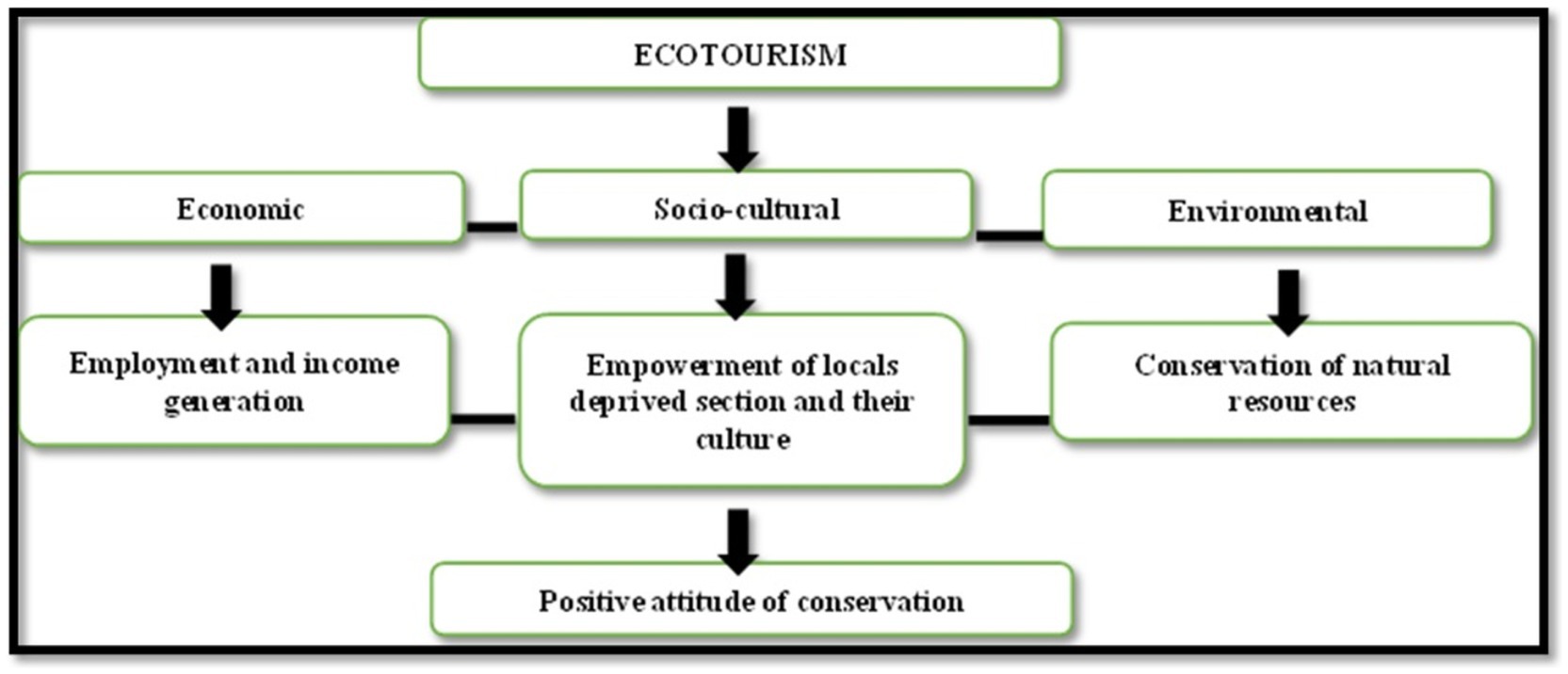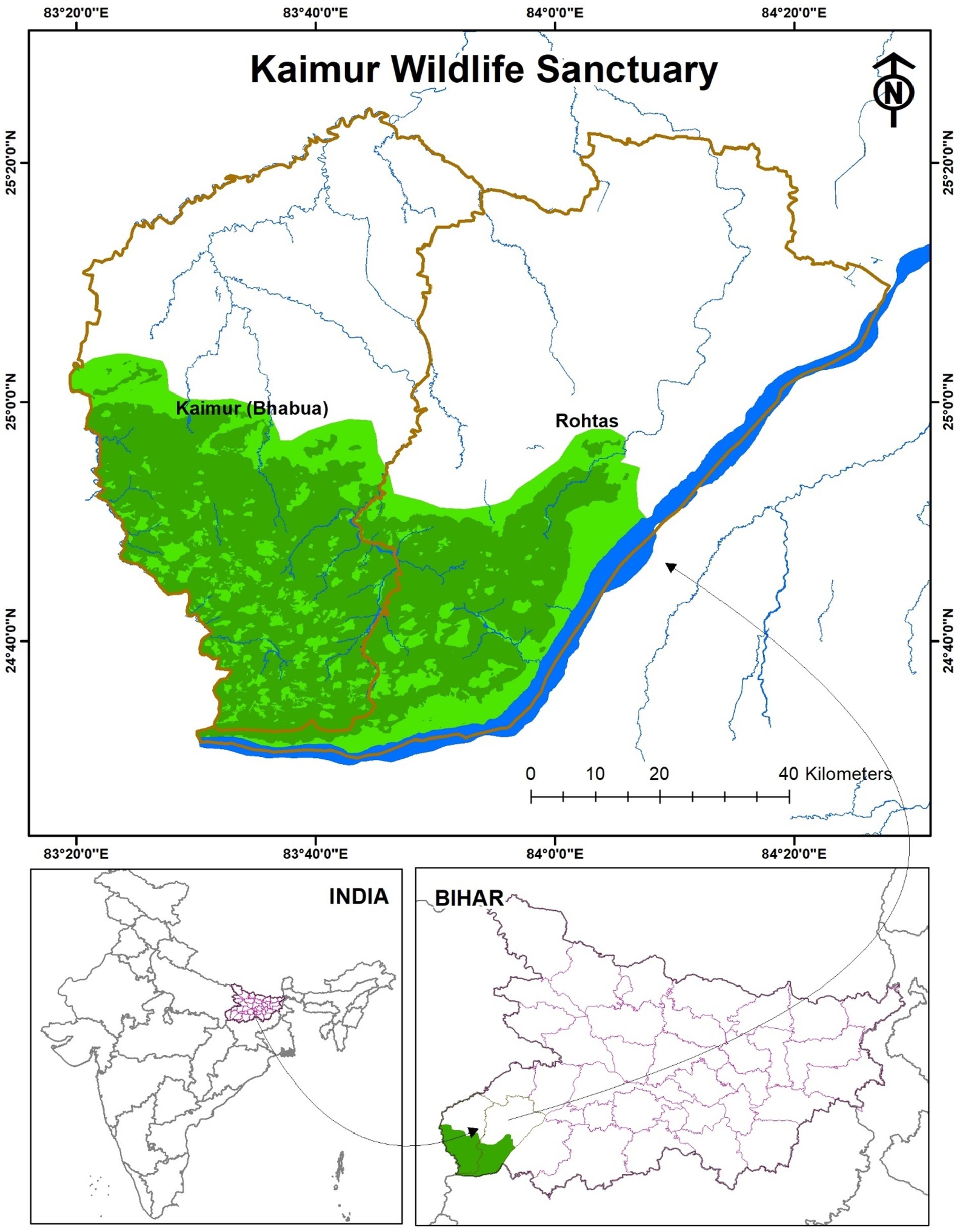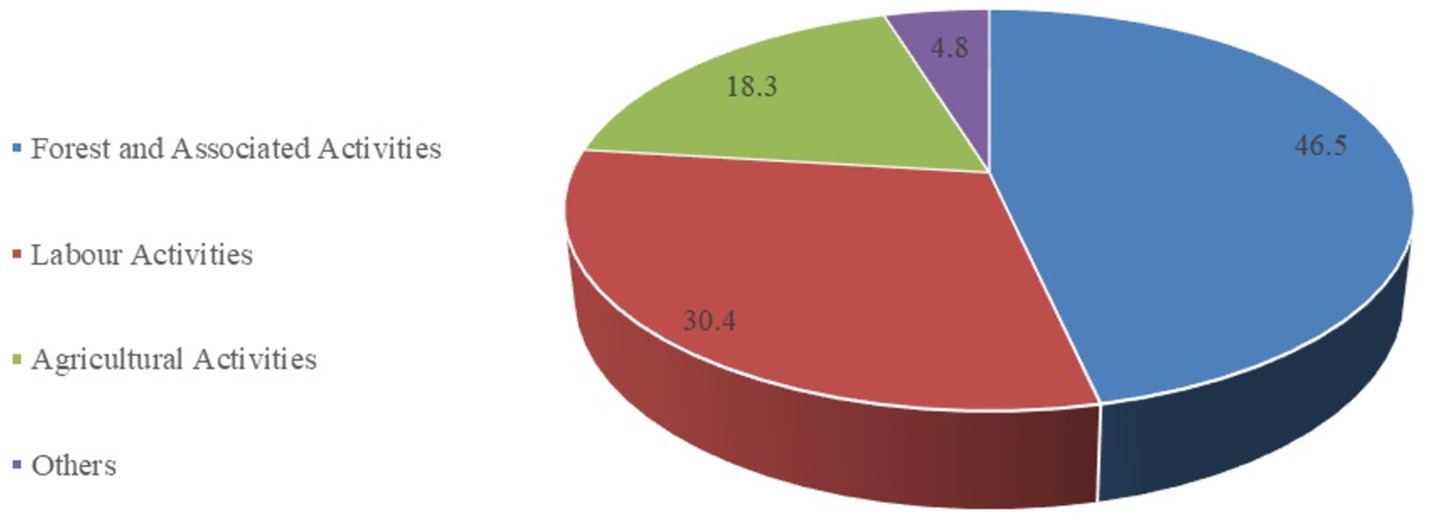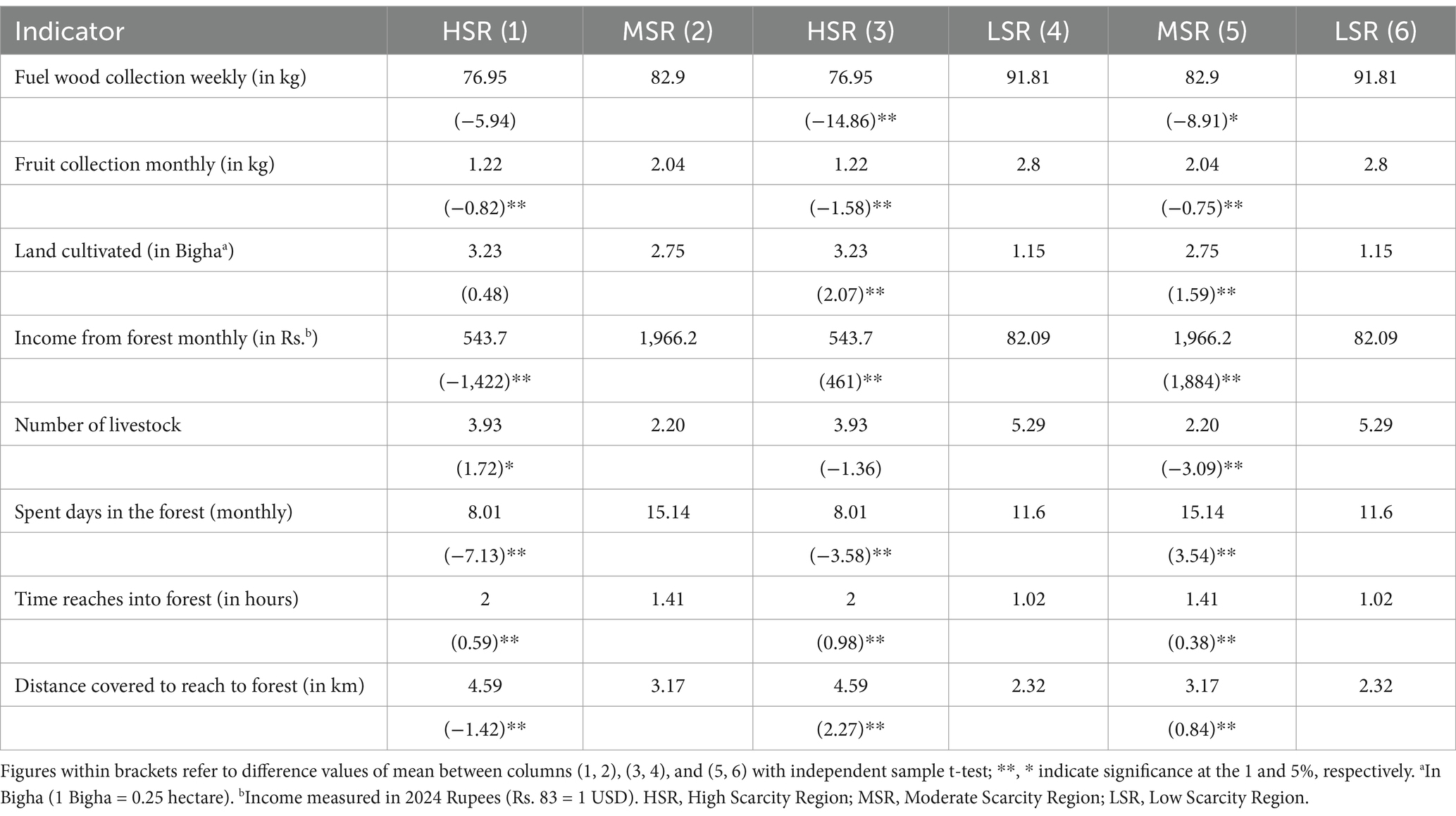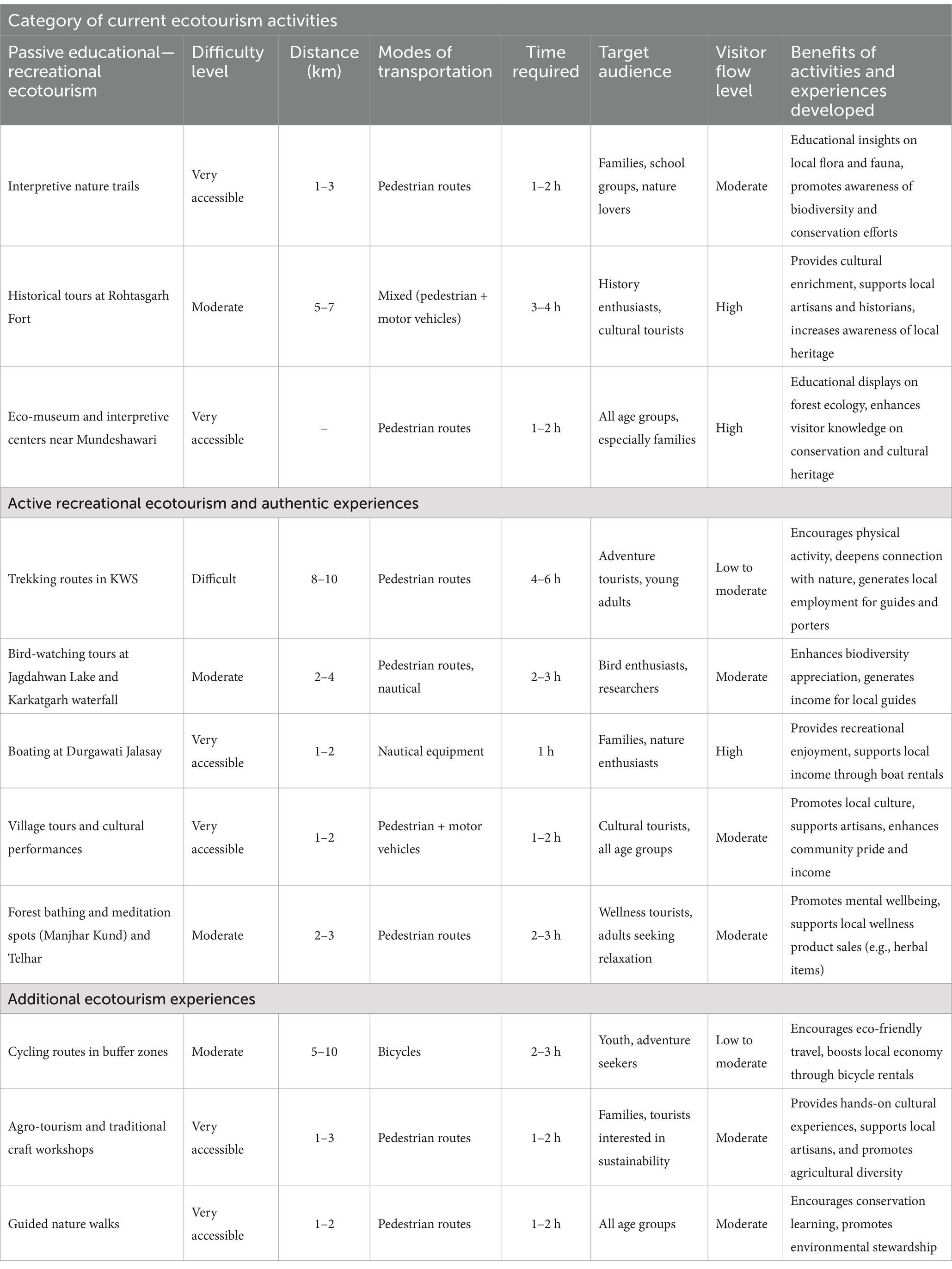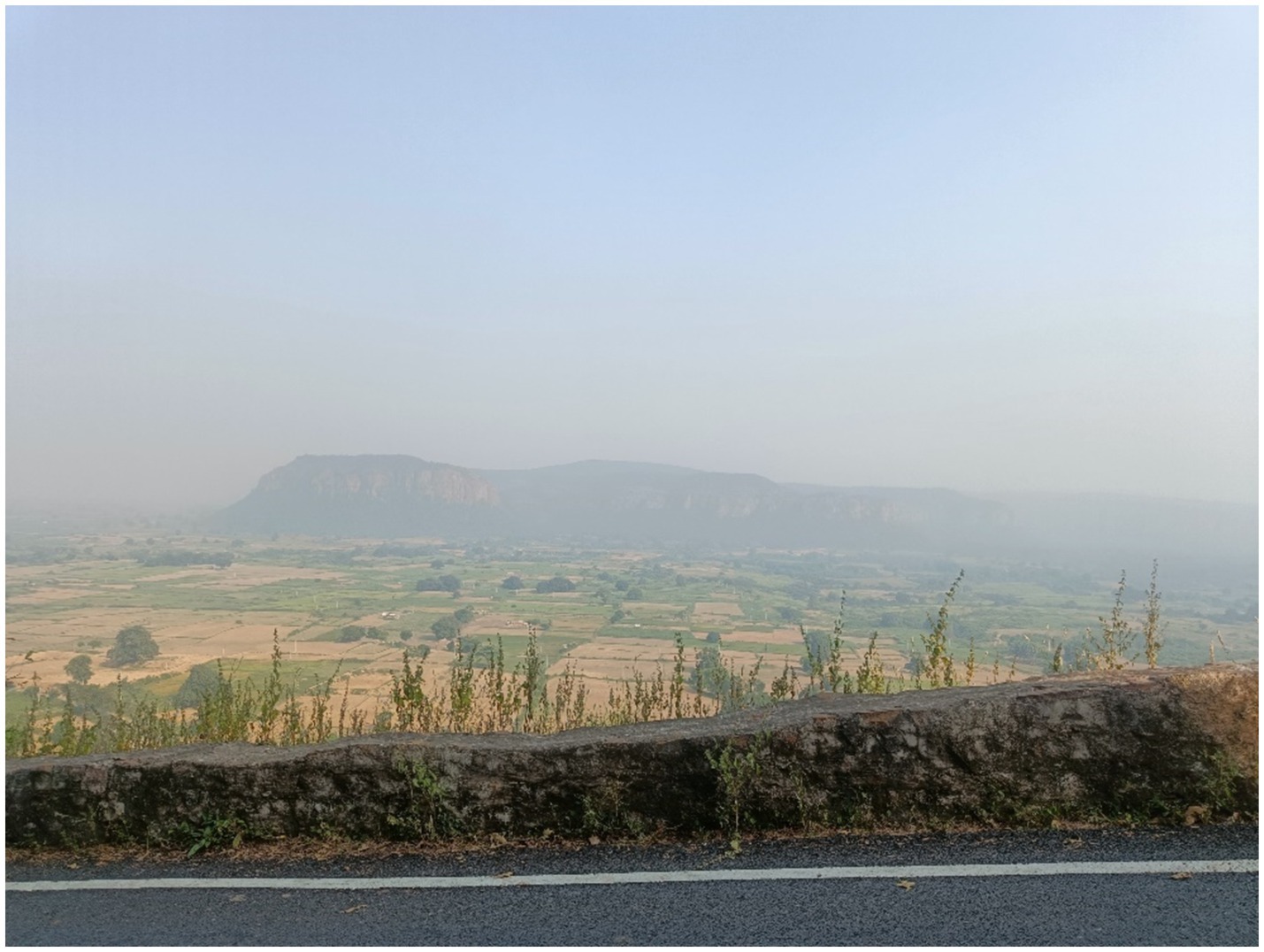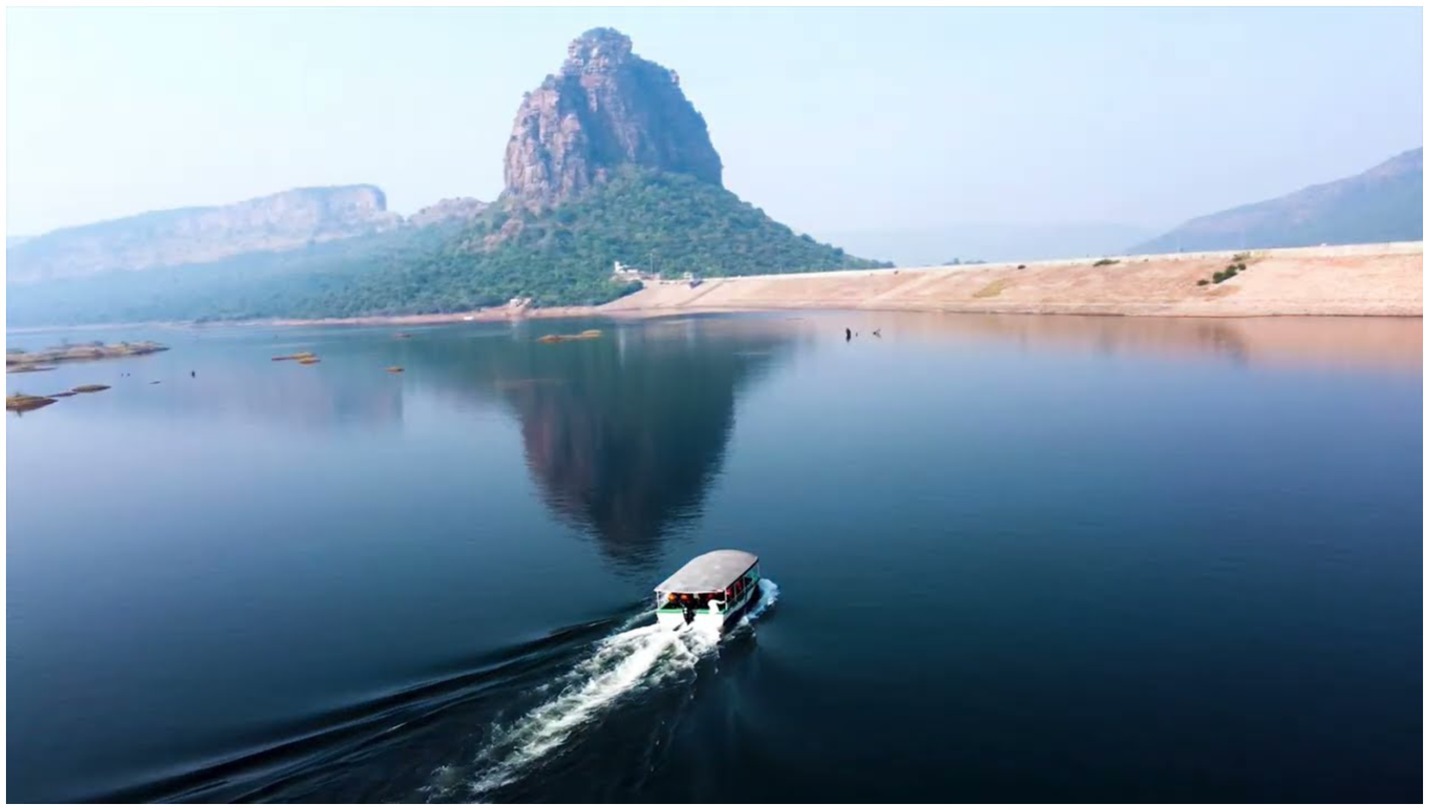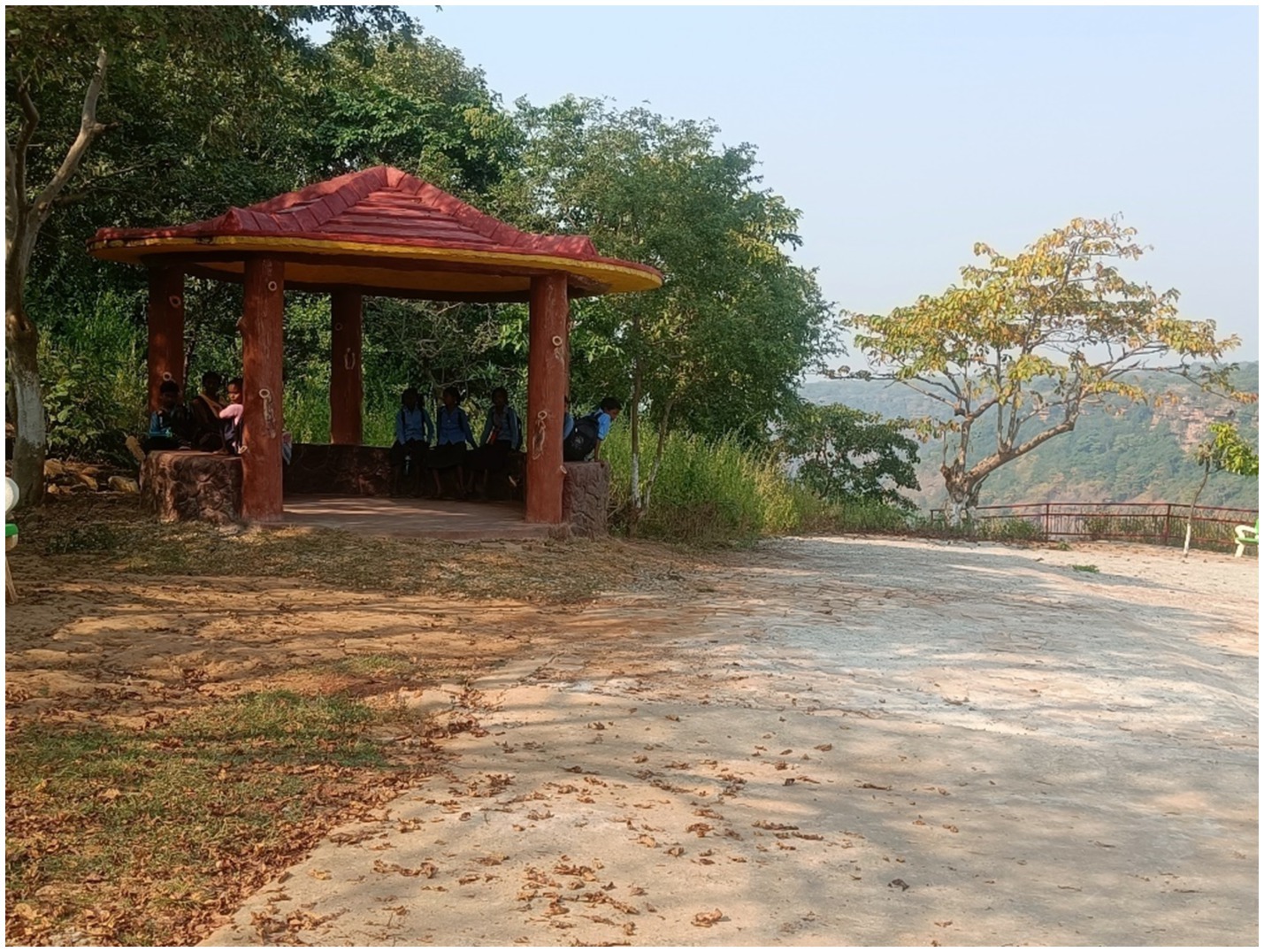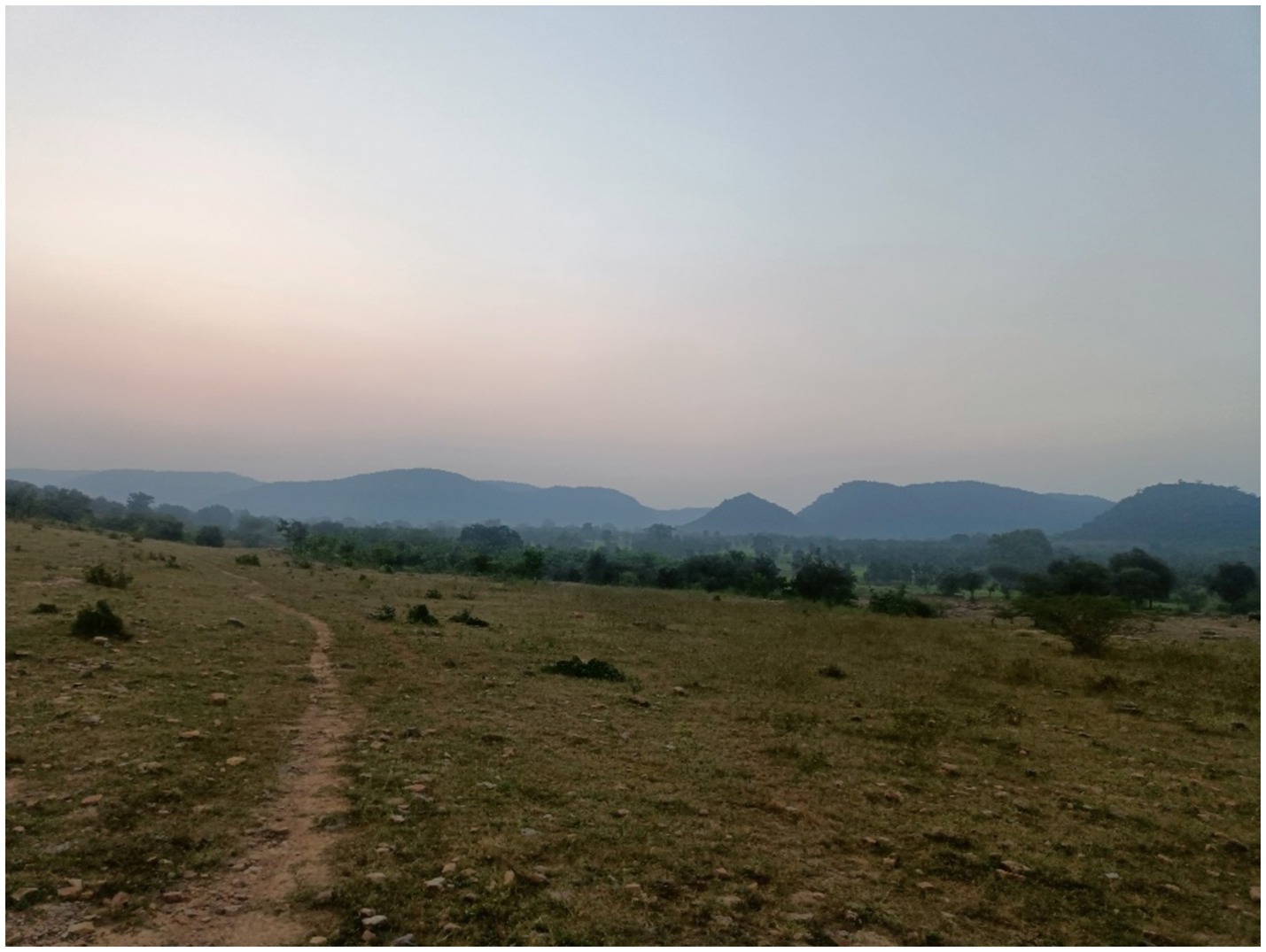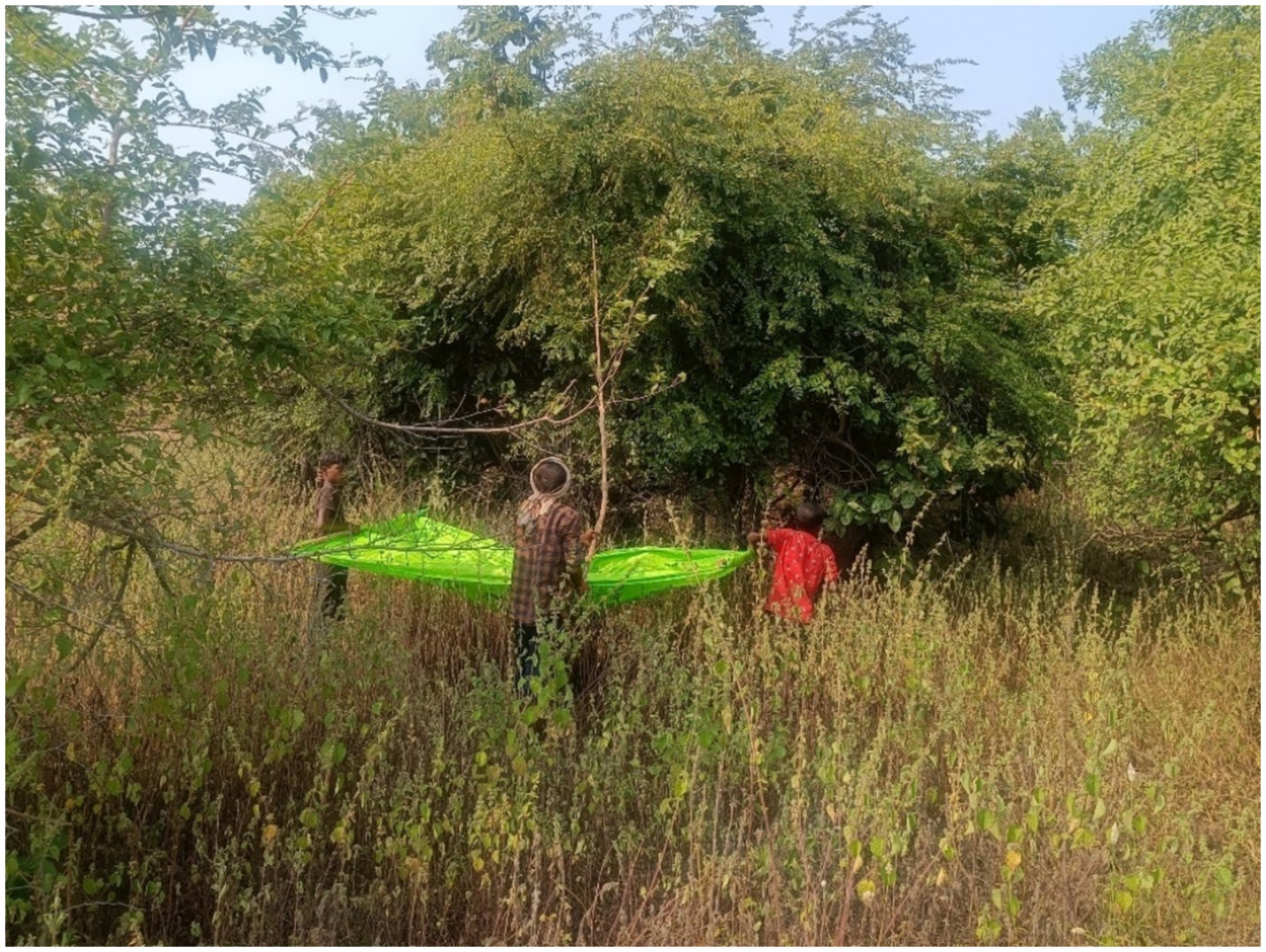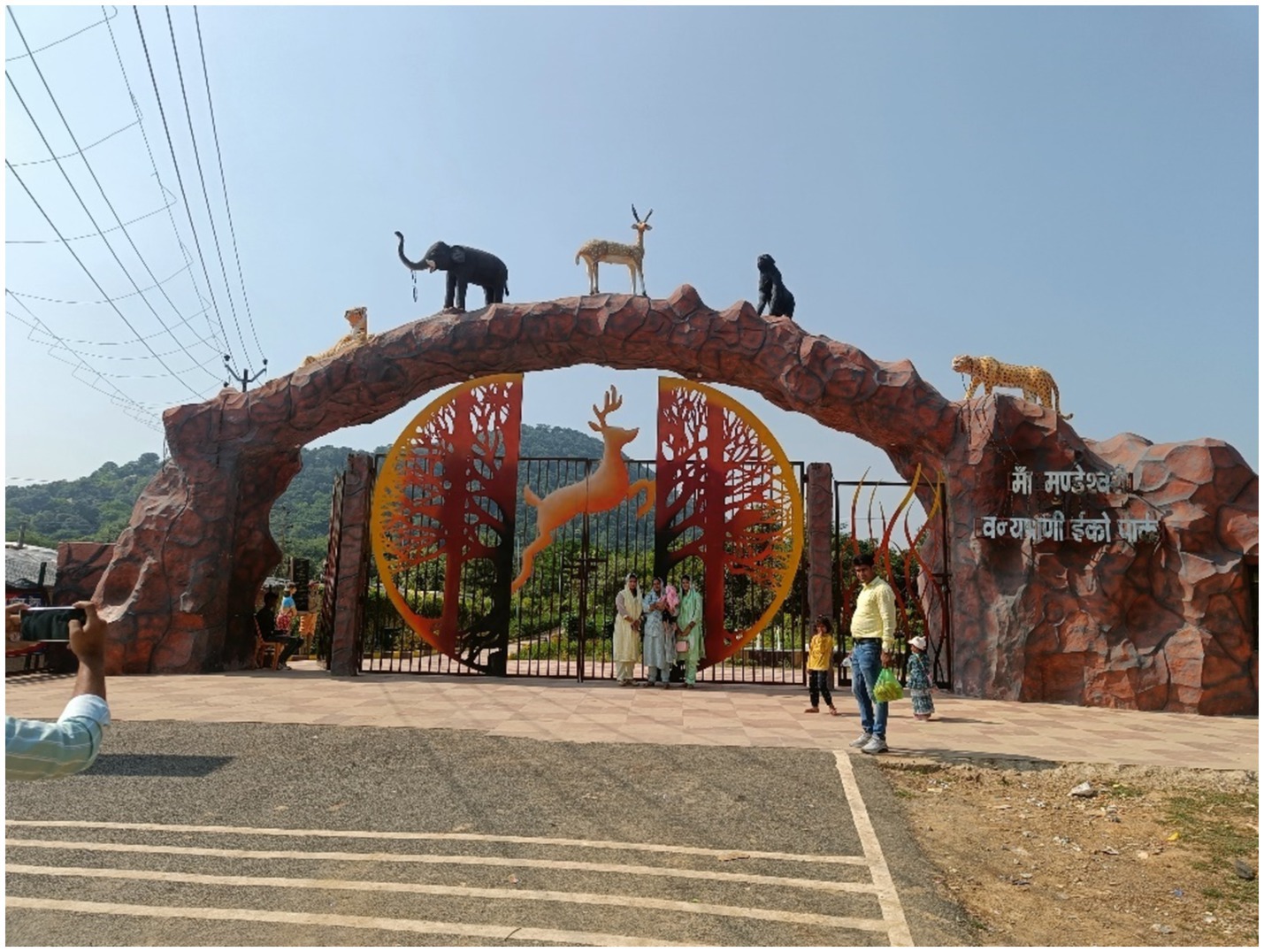- 1Department of Geography, Kalindi College, University of Delhi, New Delhi, India
- 2Department of Geography, Tourism and Territorial Planning, Centre for Territorial Studies, and Analysis, University of Oradea, Oradea, Romania
Effective forest management in India must address the economic needs of local communities, often displaced by restrictive policies. These marginalized local communities, despite their traditional knowledge, lack alternative income sources, necessitating integration into management or exploration of options like ecotourism. Recognized for balancing conservation and livelihood support, ecotourism offers a viable solution to enhance economic opportunities while conserving resources. This paper explores ecotourism’s potential to boost local economies and examines how current management practices and alternative livelihoods can address resource scarcity in Kaimur Wildlife Sanctuary, India. The study employed a combination of qualitative research methods, including semi-structured interviews, surveys, on-site observations, focus group discussions, and literature reviews, along with a cross-sectional survey approach that integrated both qualitative and quantitative data collection to provide comprehensive insights. The study reveals that impoverished communities near forests, reliant on indigenous knowledge and resources, have been severely affected by forest degradation and current management practices. The findings highlight community-based ecotourism as a promising solution for sustainable income generation in the region, helping to mitigate resource degradation and support sustainable development. However, the region’s ecotourism potential is hindered by inadequate infrastructure, training & opportunities, and public awareness. Developing ecotourism as an alternative income source, alongside an inclusive forest management strategy that integrates social diversity, livelihood generation, and conservation, is essential for promoting nature conservation, reducing poverty, and enhancing the well-being of local communities. Strengthening non-agricultural livelihoods and preserving indigenous knowledge through ecotourism is crucial for effective resource management, while the study underscores the importance of community involvement in forest governance, offering valuable insights for policymakers and conservationists in developing sustainable management strategies.
1 Introduction
Forests have been vital to surrounding communities, supplying essential resources such as food, shelter, and fuel, while also holding significant cultural, religious, and spiritual value. Estimates from the FAO (2014) and the World Bank (2004) indicate that approximately 1.6 billion people globally rely on forests for their livelihoods. In India, forestry is the second-largest land use after agriculture, with an estimated 275 million rural inhabitants about 27% of the country’s population depending on forests for subsistence and income. This income largely comes from the sale of fuelwood, fodder, bamboo, and other non-timber forest products, with fuelwood meeting the domestic energy needs of 70% of India’s rural population (FAO and UNEP, 2020).
Non-timber forest products such as firewood, fodder, and various items predominantly gathered by women provide shorter gestation periods and offer greater extraction potential than timber, which tends to be within the domain of men (Molinas, 1998; Agarwal, 2009; Coleman and Fleischman, 2012; Coleman and Mwangi, 2013). However, forest degradation over recent decades has disrupted these traditional livelihoods, diminished cultural and spiritual connections, raised global environmental concerns, and unequally impacted marginalized groups (Sunderlin et al., 2005; Davidar et al., 2010; Angelsen et al., 2014; Wunder et al., 2014; Newton et al., 2016; Banday et al., 2021). Lower-caste and Indigenous communities, who possess traditional forest knowledge and deep ties to these environments, have borne the brunt of this degradation, which has exacerbated existing social inequalities. The forest’s decline has not only favored a small segment of society but has left many communities without access to sustainable livelihoods, contributing to uncertain futures. Furthermore, the degradation has intensified the labor demands on women, who are primarily responsible for collecting fuelwood, fodder, and fruits from the forest (Islam et al., 2015).
Forest conservation, crucial for both community sustainability and environmental quality, has therefore become a global priority. Numerous regions have initiated conservation measures, adopted modern methods, and engaged local institutions. However, for conservation strategies to be effective and enduring, it is essential to recognize the economic benefits of forest preservation. Unfortunately, many conservation policies have overlooked the basic needs of rural communities, neglecting the skills, values, and decision-making roles of approximately 90% of those most affected. This study aims to provide ecotourists with a thorough understanding of the impacts on these communities, focusing on the challenges posed by land conversion and their adaptation to alternative livelihoods. Ecotourism has emerged as a crucial market-based approach to forest conservation, offering an environmentally friendly income source that harnesses forest resources in a non-consumptive manner (Wunder, 1999; Boley and Green, 2016). By valuing forest-based recreational and wellbeing services, ecotourism bridges rural, urban, and natural environments (Lindberg et al., 1998; Battles et al., 2001; Termansen et al., 2008; Ahtikoski et al., 2011; Fredman et al., 2012; Heyman, 2012; Abildtrup et al., 2013; Korpela et al., 2014; De Meo et al., 2015; Dudek, 2017; Bötsch et al., 2018; Komossa et al., 2018; Shariff et al., 2020; Hrůza et al., 2021; Tudoran et al., 2022; Rathmann, 2023; Ristić et al., 2024).
Defined by The International Ecotourism Society as responsible travel that benefits both the environment and local communities, ecotourism is grounded in principles of environmental protection, cultural respect, and economic benefits. World Tourism Organization (UNWTO) (2002) promotes sustainable tourism through community involvement and interpretive experiences. Advocates regard ecotourism as a conservation tool capable of generating employment and reducing poverty (Holland et al., 2003; Stronza, 2007; Wishitemi et al., 2015), though critics point to possible environmental harm, economic inequality, and adverse social effects (Gulinck et al., 2001; Coria and Calfucura, 2012). In forest villages, ecotourism can provide an ideal, ecologically sustainable source of income, potentially raising local living standards and reducing pressure on natural resources. This approach supports ecological balance, fosters regional and international cooperation, and facilitates knowledge exchange between rural and urban areas (Kahveci, 2022). As a sustainable model, ecotourism underscores the interconnectedness of tourism and development (Bansal and Kumar, 2011) and integrates environmental, socio-cultural, and economic systems (Wall, 1997). Its growth provides a unique opportunity to combine rural development, resource management, and conservation on a global scale (Hvenegaard, 1994).
India, with its diverse forests, abundant wildlife, and rich cultural heritage, is well-positioned to become a premier ecotourism destination. Despite ecotourism’s potential to enhance sustainable forest management and provide alternative income sources, few studies have rigorously explored its role in supporting local communities and conserving forest cover (Pujar and Mishra, 2021). This study therefore evaluates ecotourism’s potential as a sustainable income source and conservation tool in the Kaimur Wildlife Sanctuary, India. It investigates the interactions between local communities and forest resources, considering alternative income sources amid resource scarcity, and assesses how these can be integrated into sustainable conservation practices. Specifically, it examines ecotourism’s role in addressing economic challenges and resource scarcity among marginalized communities, emphasizing the encouraging importance of community participation in forest management (Bhattacharya et al., 2010). The study posits that ecotourism, when aligned with inclusive forest management strategies, can serve as a sustainable solution for local livelihood needs, forest conservation, and mitigating adverse impacts from current management practices in Kaimur Wildlife Sanctuary. It hypothesizes that community-based ecotourism can enhance economic opportunities for marginalized groups while supporting long-term conservation goals by promoting local involvement in resource management.”
1.1 The place of ecotourism between theoretical exploration and concrete socio-economic initiatives
Ecotourism is a conservation-oriented approach that seeks to protect natural resources while offering economic, social, and cultural benefits to local communities (Figure 1). It provides livelihood opportunities and supports the conservation of wildlife, bird habitats, rivers, mountains, deserts, coral reefs, and forests (Salafsky and Wollenberg, 2000; Abbot et al., 2001; Kiss, 2004; Shah, 2007; Dinca et al., 2023; Atchombou et al., 2023). Evidence suggests that income from tourism fosters positive attitudes toward conservation among local communities (Chen et al., 2005; Gyan and Nyaupane, 2011). Growing three times faster than conventional tourism, ecotourism is projected to capture 5% of the holiday market, highlighting its expanding influence on rural economies and biodiversity conservation goals (Blangy and Mehta, 2006; Das, 2011; Sharpley, 2006).
For many rural areas, ecotourism offers economic opportunities, including employment, small business development, and skill-building (Scheyvens, 2000; Jalani, 2012). Indigenous communities benefit through income diversification and improved living standards (Stronza, 2007). Well-implemented ecotourism initiatives can strengthen livelihoods by promoting employment in tourism services, such as eco-lodges, restaurants, souvenir shops, and transportation (Ashley and Roe, 2002; Goodwin, 2002; Mustika et al., 2012; Reimer and Walter, 2013). Studies in India’s Sunderbans region show that income from tourism supports annual household consumption, supplementing subsistence farming (Guha and Ghosh, 2007). Although seasonal, ecotourism income encourages resource conservation and can finance education, building human capital within communities (Stronza, 2007; Surendran and Sekar, 2011).
Ecotourism also plays a role in challenging traditional gender roles. Horton (2009) notes that ecotourism often expands women’s responsibilities beyond domestic tasks, while Scheyvens (2000) highlights its potential for indirect empowerment through improved access to essential services. In India, eco-development initiatives, such as those by Mishra et al. (2009), have prioritized marginalized groups, linking environmental sustainability with financial, institutional, and social empowerment. However, while ecotourism can positively affect socio-cultural conditions, it also has risks, including overcrowding, increased crime, cultural erosion, and health risks. For instance, increased tourism has led to overcrowding in protected areas like Kanha and Corbett National Parks, disrupting wildlife and displacing local communities (Banerjee, 2010; Wunder, 1999). The International Ecotourism Society defines ecotourism as “responsible travel to natural areas that conserves the environment and improves the welfare of local people” (Das and Chatterjee, 2015). Similarly, Kimengsi (2014) emphasizes the role of ecotourism in enhancing livelihoods and conserving natural resources, including forests. Recognized as a sustainable development strategy, ecotourism provides environmental, economic, and social benefits but also faces challenges, such as uneven benefit distribution, limited local knowledge, environmental degradation, and social disruption (Kiper, 2013; Kumar et al., 2020).
Ecotourism principles advocate for sustainable practices that address social, political, and environmental issues while benefiting local populations (Das and Chatterjee, 2015). Key themes in ecotourism development include poverty reduction, community engagement, and environmental conservation (Andereck et al., 2005; Clifton and Benson, 2006; Stronza and Gordillo, 2008). As one of the fastest-growing sectors in tourism, ecotourism has proven its positive economic impact by generating jobs and improving quality of life (Eshun et al., 2016; Hugo and Nyaupane, 2010). Environmental sustainability is central to successful ecotourism, with stakeholder participation essential for balancing economic, social, and environmental impacts. Québec Declaration on Ecotourism (2002) emphasizes the importance of integrating environmental conservation with social equity and economic development. Equitable and sustainable ecotourism requires a multidisciplinary approach to address governance and climate challenges, emphasizing holistic development that preserves socio-cultural integrity and supports local livelihoods (Johnson et al., 2019).
2 Materials and methods
2.1 Study site
The study was conducted in villages surrounding the Kaimur Wildlife Sanctuary (KWS), located in the Kaimur and Rohtas districts of Bihar, India (Figure 2). Bihar, in eastern India, is known for its agricultural productivity and dense population but has limited forest coverage, comprising only 7.85% of the state. However, the Kaimur and Rohtas districts have the highest forest cover in Bihar, with forests accounting for 24% of the area (State Forest Report, Forest Survey of India, 2021). Established in 1979 and spanning approximately 1,342 km2 (Table 1), KWS borders the provinces of Jharkhand and Uttar Pradesh. It is notable for its natural features, including densely forested plateaus, waterfalls, lakes, ancient rock art, and lush hills. KWS experiences a tropical climate with three distinct seasons: summer (March–June) with temperatures reaching 40–45°C, a monsoon season (July–September) with 1,100 mm of rainfall and temperatures of 25–35°C, and winter (October–February) with temperatures from 10 to 25°C. Local wind patterns and high evapotranspiration rates during summer are offset by monsoon rains. The sanctuary’s soils, which include red, laterite, and alluvial types, are shaped by the local geology and climate and support diverse vegetation. While red and laterite soils are iron-rich but low in nitrogen, phosphorus, and potassium, fertile alluvial soils found in valleys support diverse plant growth. Soil textures vary from sandy to clayey, facilitating water infiltration, though erosion remains a risk on steeper slopes (Anand and Peters, 2022; Anand et al., 2022; Sen et al., 2014).

Table 1. Forest distribution and growth status in the region (Source: State Forest Report, Forest Survey of India).
The sanctuary hosts a diverse range of species, including Sambar (Rusa unicolor), Chital (Axis axis), and the endangered Blackbuck (Antilope cervicapra), alongside various primates, reptiles, and numerous bird species. These forests are vital to local livelihoods, providing timber, fuelwood, fodder, and fruit. A popular winter tourism destination, KWS features wildlife such as Blackbuck, Chital, Sambar, Chinkara, Blue Bull, Grey Quail, Francolin, and Peafowl (Tahoor et al., 2016). The tropical dry deciduous forests support significant flora, including Indian Rosewood (Dalbergia latifolia), Teak (Tectona grandis), and Tendu (Diospyros melanoxylon), with Tendu leaves used locally for Bidi production. Mahua (Madhuca longifolia) fruits are also harvested for traditional beverages, underlining the forest’s importance for local communities.
The socio-economic landscape of KWS is diverse, with many residents from marginalized scheduled castes and tribal communities who rely heavily on forest resources. Significant land-use changes in recent decades have converted forest areas to agricultural land due to population pressure. Although government programs have expanded agricultural cultivation, many marginalized and indigenous populations continue to depend on forest resources rather than agriculture or animal husbandry. Despite diverse social backgrounds, communities around the sanctuary share a reliance on forest resources (Bose et al., 2012), facing pervasive poverty, economic inequality, and restrictive forest management policies that limit forest access and NTFP collection. Afforestation projects primarily employ locals as guards but rarely involve them in broader forest management. Recognizing KWS’s importance, the government plans to designate the sanctuary as Bihar’s second Tiger Reserve, aiming to enhance conservation efforts, promote ecotourism, and support sustainable livelihoods.
2.2 Data collection and analysis
This study used a mixed-methods approach, combining quantitative and qualitative data collection techniques for a comprehensive analysis. Quantitative data were gathered through structured surveys across nine villages in the study area. A stratified random sampling method was employed, dividing villages into three groups based on proximity to the ecotourism site and forest resource availability: low forest cover (high resource scarcity), medium forest cover (moderate scarcity), and high forest cover (low scarcity). Three villages from each group were selected, totaling nine villages with 327 households and 1,157 residents (652 males and 505 females). The survey included sections on demographics, natural resource dependency, economic conditions, involvement in ecotourism, environmental conservation attitudes, alternative income sources, community conservation roles, and institutional support. A pilot study with 10 households in Masani village validated and refined the survey format. Data collection occurred from February to May 2024. Qualitative data were collected through semi-structured interviews, focus group discussions, and direct observations to gather in-depth information on villagers’ attitudes, motivations, and experiences. Focus group discussions included village forest conservation committees, with representation from various social and gender groups. Key informant interviews were conducted with forest officials, panchayat representatives, and senior villagers to provide insights into community roles in conservation. Observations during field visits supplemented the qualitative data.
The study utilized both primary and secondary data sources. Primary data included household interviews, focus group discussions, and key informant interviews. Secondary data sources included the Forest Survey of India, Census of India, and relevant NGO reports. Data were analyzed using SPSS (version 25) and visualized in Excel. Descriptive statistics and econometric methods assessed the impacts of deforestation on livelihoods and explored ecotourism’s potential in the area. Key demographic variables, such as household position, gender, age, and employment status, were measured, along with socio-economic conditions and livelihoods, using a five-point Likert scale (1 = strongly disagree to 5 = strongly agree) to gauge attitudes. Additionally, a case study approach (Yin, 2011) examined the interactions between ecotourism and livelihoods, focusing on poverty reduction. Findings from this approach are context-specific and may not be generalizable to other settings (Veal, 2006; Yin, 2009).
3 Results
3.1 Relationship between forest resources and local communities
The relationship between forest resources and local communities in the Kaimur Wildlife Sanctuary (KWS) is deeply interwoven, driven by historical reliance, economic needs, and cultural traditions. As a key ecological zone in Bihar, KWS supports local livelihoods but also faces conservation challenges due to its heavy utilization. Local communities, comprising various social groups, have historically depended on KWS forests for sustenance through food, fuel, fodder, medicinal plants, and materials for handicrafts. Timber extraction has long been a mainstay for construction and industry, while wood serves as fuel and building material for livestock shelters (Hegde and Enters, 2000; Dash et al., 2016). Non-timber forest products (NTFPs) like Tendu leaves, used for rolling traditional cigarettes, and wild fruits and berries provide both nutrition and income. This dependence fostered sustainable practices rooted in local ecological knowledge, preserving forest health for generations. However, rising population pressures and socio-economic shifts have driven increased and unsustainable resource extraction, leading to deforestation and habitat degradation. To address these issues, there is a critical need for forest management strategies that balance conservation with the essential needs of local communities.
The economy of communities surrounding Kaimur Wildlife Sanctuary (KWS) is closely tied to forest resources, with nearly half (46.5%) of the population reliant on forest-related activities, including non-timber products and firewood, underscoring the urgent need for sustainable forest management (Figure 3). Labor activities account for 30.4% of occupations, reflecting a dependence on low-income, unskilled jobs due to limited resources, which highlights the necessity for alternative livelihoods and skill development. Agriculture comprises 18.3% of employment, likely constrained by limited arable land and challenging conditions, while only 4.8% engage in other occupations, pointing to a need for economic diversification through small businesses and training. Additionally, many residents combine agriculture with forest-based activities like harvesting non-timber forest products (NTFPs) such as fruits, nuts, and medicinal plants, providing critical income for marginalized groups (Harbi et al., 2018). Forests also supply livestock fodder and fuelwood, vital for rural daily life. However, this reliance on forest resources presents sustainability challenges, as forest degradation reduces access to essential resources, exacerbating poverty and inequality. In response, some individuals turn to illegal logging or poaching, intensifying environmental strain and threatening biodiversity.
Grazing and the collection of non-timber forest products (NTFPs), such as Tendu leaves, fruits, and medicinal plants, are essential for the livelihoods of many families in Kaimur Wildlife Sanctuary (KWS), with some residents also employed in conservation roles by local officials. Fuelwood and fodder are commonly gathered due to their free availability, while fruit and timber collection vary according to economic status, with timber use decreasing due to conservation efforts. Formal employment in forestry remains limited (12.68%), and engagement in ecotourism is minimal (0.05%), highlighting the untapped potential for sustainable livelihood alternatives (Table 2).

Table 2. Engagement in forest and associated activities by the local households (Source: Field Survey in Kaimur Wildlife Sanctury, Annex 1).
The dependency on forest resources underscores the need for sustainable management and economic diversification to alleviate ecological stress and improve community resilience. The challenging KWS terrain and socio-economic disparities, particularly among indigenous and lower-caste groups, have intensified reliance on forest resources. Forest degradation and restrictive policies have deepened poverty, while agriculture is largely controlled by upper-caste groups. As forest resources decline, many residents are pushed into labor markets or low-skill forest-related jobs, often with limited scope for applying their traditional knowledge. The region’s limited development in manufacturing and services further restricts economic opportunities, reducing income and limiting upward mobility. Although significant research exists on forests and livelihoods, there remains a critical need to understand the interactions between forest resources and caste dynamics in India, where caste continues to influence social and economic relations.
In the Low Scarcity Region (LSR), the primary livelihood activities involve the collection of forest products, chiefly fuelwood, fruits, and fodder, predominantly for personal consumption, with a portion sold in nearby markets. The income generated from forest-related activities in this region is influenced by both the quality and accessibility of the available resources. Conversely, the Moderate Scarcity Region (MSR) exhibits the highest forest income compared to the High Scarcity Region (HSR) and LSR. This income disparity can be attributed to the presence of supplementary income sources in the MSR, coupled with improved market access, which facilitates greater sales of forest products than those observed in HSR and LSR. In MSR, sales of fuelwood constitute the primary income source derived from forest resources, driven by proximity to markets, enhanced transportation infrastructure, and easier access to forested areas. The time spent in forested environments and the distance traveled for resource collection are significantly affected by the level of resource scarcity, which is greatest in HSR and least in LSR (Table 3).
Beyond economic reliance, forests are vital to the cultural and social structures of local communities. Traditional beliefs, practices, and livelihoods are intricately linked to forest ecosystems. Numerous indigenous communities maintain distinct cultural connections to specific trees, animals, and landscapes, which are fundamental to their identity and heritage. Festivals, rituals, and customs often celebrate this relationship with nature, fostering a sense of stewardship and responsibility toward forest conservation. Furthermore, forests provide opportunities for social cohesion and community engagement. Emerging community-based organizations and local cooperatives are promoting sustainable practices, eco-tourism, and crafts that embody traditional knowledge. These initiatives empower communities, enabling them to achieve economic benefits from forest conservation while nurturing pride in their cultural heritage.
3.2 Forest management and co-benefits for nature and community
The Kaimur Wildlife Sanctuary (KWS), located in the northern plains of Bihar, represents a critical site for forest conservation, biodiversity, and socio-economic upliftment. Given the ecological richness and socio-cultural diversity of the area, sustainable forest management in KWS focuses on aligning conservation goals with community needs, producing dual benefits for both nature and local populations. This approach of forest management is integral for maintaining ecological balance, safeguarding biodiversity, and enhancing the quality of life for local communities, particularly those economically dependent on forest resources. Key strategies in forest management include zoning, community involvement, and controlled access to ensure conservation and sustainable resource use. Zoning divides KWS into core, buffer, and transition zones: core areas are strictly protected for wildlife, buffer zones support low-impact ecotourism, and transition zones allow sustainable use by local communities, achieving a balance between ecosystem preservation and community needs. Community involvement is integral, as residents, many of whom traditionally rely on forest resources, actively participate in afforestation, nursery work, and forest monitoring, fostering a sense of ownership and strengthening conservation efforts. Controlled access and visitor capacity management limit ecological disturbance in high-demand areas, with eco-friendly infrastructure like wooden walkways to protect habitats while enriching visitor experiences. This balanced approach aligns tourism, conservation, and community empowerment to preserve KWS’s unique environment.
Co-benefits for nature and community within the region encompass biodiversity conservation, habitat restoration, and sustainable resource utilization, alongside economic opportunities, empowerment, and improved living standards for residents. Initiatives such as reforestation and habitat restoration are crucial for reviving degraded areas, enhancing biodiversity by supporting various native species and promoting ecosystem resilience. Sustainable practices, including controlled harvesting of non-timber forest products, prevent over-extraction, ensuring essential resources remain available for future generations while providing locals with supplementary income. Ecotourism creates employment opportunities in guiding, hospitality, and handicrafts, alleviating poverty, and income inequality, while community-led marketplaces enable direct benefits from tourism revenues. KWS’s focus on skill development, particularly for women and marginalized groups, equips locals with training in guiding and eco-lodge management, enhancing employability and reinforcing the conservation mission by empowering residents as active environmental stewards. Furthermore, improved access to health and education funded by tourism revenues elevates living standards, reduces reliance on unsustainable practices, and fosters social cohesion by promoting shared responsibility for the forest, thereby strengthening community ties and contributing to overall wellbeing.
The forest management framework also integrates traditional ecological knowledge, utilizing indigenous practices like rotational grazing and seasonal harvesting to support sustainable resource use while honoring local cultural traditions. This approach fosters a conservation model that respects local heritage while promoting sustainable development. To maintain positive outcomes for both nature and community, KWS employs regular monitoring and evaluation, tracking indicators such as biodiversity, community income from tourism, and visitor satisfaction. This adaptive, data-driven strategy enables timely adjustments, ensuring that conservation goals and community benefits remain aligned. The forest management strategy in Sanctuary serves as a holistic model for sustainable development, one that merges ecological preservation with socio-economic progress. By fostering collaboration between local communities, government bodies, and conservation organizations, KWS promotes a balanced approach to managing its rich forest resources. This model not only ensures the long-term conservation of the sanctuary’s unique ecosystems but also empowers local communities through economic opportunities, skill development, and enhanced living standards. Through its integrated approach, KWS stands as a promising example of how protected areas can provide co-benefits for nature and humanity, contributing to sustainable forest management and community resilience in the face of ecological and socio-economic challenges.
3.3 Current state of tourism and ecotourism in the region
Despite its rich biodiversity, scenic landscapes, historical landmarks, indigenous cultural heritage, religious sites, and numerous waterfalls, remains relatively underdeveloped as a tourism destination compared to other wildlife sanctuaries in India (Patel and Anuragi, 2023). Currently, KWS primarily draws local tourists and a limited number of adventure seekers interested in its natural beauty and historical sites. Although key attractions (Table 4 and Figure 4) resonate with local and regional visitors, the sanctuary’s full tourism potential is still largely untapped. Traditionally, religious sites such as Mundeshwari Temple and Gupteshwar Cave have attracted visitors, gradually gained regional significance and drawn pilgrims from other parts of the state. Beyond its cultural importance, the area’s natural beauty also appeals to visitors from neighboring states for picnics, adventure activities, and wildlife observation. Recognizing the ecological and cultural significance of KWS, the state government has recently launched initiatives to enhance its tourism profile. These efforts include the introduction of boating and fishing activities at Karamchat and Jagdahwahan Dam Lakes, the development of an eco-park near Karakat Waterfall, and the installation of trails and recreational amenities around Telhar Waterfall and Manjhar Lake. To improve accessibility, transportation infrastructure has been upgraded, and facilities such as a museum, stairways, and shelters have been added near Mundeshwari Temple (Table 4 and Figure 4).
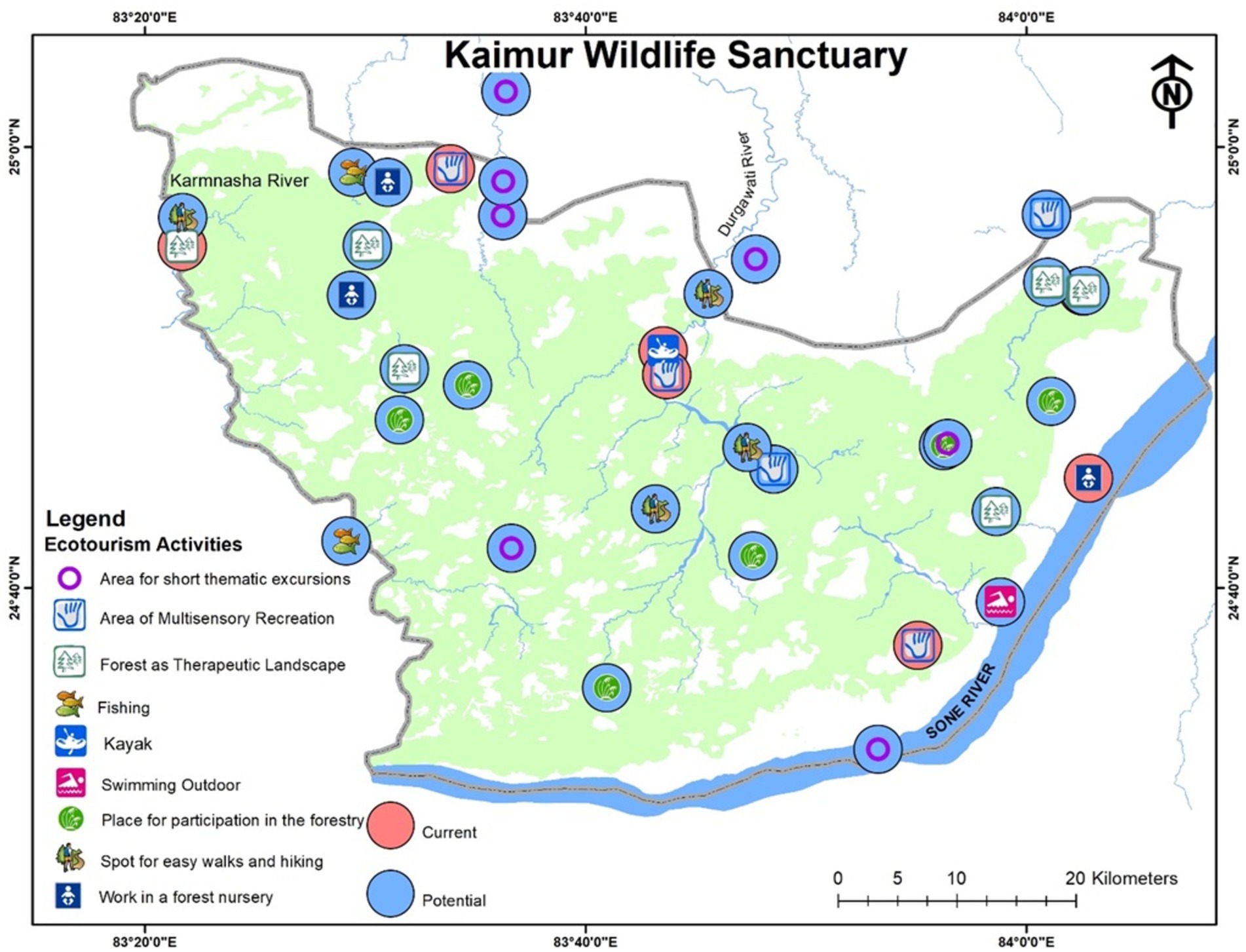
Figure 4. Main natural and cultural attractions responsible for activities in passive educational-recreational ecotourism, active recreational ecotourism, and authentic experiences.
Additionally, new guesthouses, hotels, and restaurants have been established to accommodate non-local visitors, and temporary facilities are provided during religious festivals with support from government bodies and local communities.
The Bihar government has recently intensified efforts to enhance tourism appeal in the Kaimur Wildlife Sanctuary (KWS), with plans to designate it as a tiger reserve and allocate funds to develop attractions such as waterfall sites and boating activities near man-made dams. Although some level of community participation exists, primarily in guiding services and handicraft production, these initiatives remain minimal. Government and NGO-led projects have introduced conservation efforts and preliminary tourism development through pilot projects involving local communities, yet the overall tourism infrastructure in KWS remains underdeveloped. Key limitations include inadequate infrastructure, such as poor road conditions, limited accommodations, and a lack of organized guided tours, which restrict visitor numbers. Additionally, KWS’s offerings are under-promoted outside the local region, further limiting its recognition as a tourist destination. Despite the sanctuary’s high potential for advancing sustainable conservation and economic growth, organized and environmentally conscious tourism practices that would benefit both local communities and biodiversity are not yet widely implemented.
KWS faces significant limitations in eco-friendly infrastructure, lacking designated nature trails, interpretation centers, and eco-lodges essential for attracting eco-tourists. Although opportunities for wildlife observation, hiking, and cultural tourism exist, they remain underdeveloped, with inadequate facilities to support large-scale tourism. Basic amenities, such as accommodations, transportation, and visitor services, are sparse, and access to key attractions is impeded by poorly maintained roads. Unlike other established nature destinations, KWS has a low profile, primarily due to limited promotional efforts and scarce accessible information. While some localized initiatives exist, they are fragmented and lack a cohesive strategy for regional tourism development. Conservation efforts are further constrained by limited resources and funding, with minimal local community involvement in tourism. Cultural and historical sites, such as ancient temples and archeological landmarks, remain largely under-promoted, and adventure activities like trekking, hiking, and camping are in early stages with few organized tours or facilities.
3.4 Ecotourism: the region’s top alternative income source
Ecotourism has the potential to become a leading alternative income source for communities surrounding Kaimur Wildlife Sanctuary (KWS) in Bihar, India, due to unique ecological, economic, and social factors. KWS is rich in biodiversity, encompassing diverse ecosystems, scenic landscapes, and species-rich habitats—including deciduous forests and bamboo groves that support wildlife such as tigers, leopards, and a variety of bird species. This natural wealth presents significant appeal to both domestic and international visitors interested in wildlife, nature, and conservation, aligning ecotourism development with conservation priorities (Stylidis et al., 2022). The local communities in Kaimur have a deep cultural connection to the forest and possess extensive indigenous knowledge that could be preserved and shared through ecotourism. By involving locals in eco-guided tours, traditional crafts, and cultural storytelling, ecotourism provides them with economic benefits while offering visitors an authentic cultural experience. This approach enhances KWS’s appeal as a destination for cultural and nature-based tourism.
Ecotourism also aligns well with conservation goals by offering a sustainable alternative to resource-extractive industries that typically lead to deforestation and habitat degradation. As an eco-friendly revenue source, ecotourism incentivizes local communities to conserve and sustainably manage the sanctuary’s resources. Income generated from ecotourism can be reinvested into conservation initiatives, such as forest monitoring and wildlife protection, creating a positive feedback loop that benefits both the environment and the community. Moreover, ecotourism can generate diverse job opportunities for local residents, including roles as tour guides, hospitality staff, artisans, and service providers. This inclusivity makes it accessible to individuals with limited formal education, helping to alleviate poverty and support economic development. Additionally, ecotourism has a ripple effect that stimulates other sectors, such as handicrafts, food production, and transportation, broadening the economic benefits. For many residents who depend on forest resources for their livelihoods, ecotourism offers a sustainable alternative, reducing pressure on local resources and fostering more sustainable resource management practices.
The results, summarized in Table 5, offer insights into community perceptions of forest conservation and the potential for ecotourism within the region. Overall, the responses reflect a somewhat reserved and neutral stance among residents toward conservation and tourism initiatives. The community shows moderate agreement that their livelihoods are connected to resources from the sanctuary, though responses reveal variation, especially in terms of forest use for fuelwood collection, an activity essential to many but marked by differing views (evidenced by a high standard deviation). This variability highlights both the central role of wood collection for sustaining local livelihoods and a reliance on the sanctuary’s resources. The findings point to ecotourism as a promising economic opportunity, though community involvement remains limited, which could impact the viability of alternative livelihood strategies linked to tourism. While there is general optimism about ecotourism’s potential to support local economies, concerns remain about the risk of exclusive benefits accruing to dominant groups and possible disruptions to traditional lifestyles. The analysis underscores a strong dependence on forest resources, mixed perceptions of the conservation benefits, and a cautious optimism regarding ecotourism’s future role in supporting sustainable livelihoods for local communities.
Among its notable sites, Karkatgarh Waterfall, once a crocodile hunting ground for Mughal and British officials, now offers tranquil scenic views, with its surrounding sandstone formations adding geological interest. Another key attraction (Figure 5), Rohtasgarh Fort, showcases impressive Mughal architecture and a rich history, with its 16th-century structures reflecting a blend of cultural and religious significance. Other popular sites include Jagdahwahan Lake, created by the Jagdahwa Dam, and Manjhar Kund, a series of waterfalls with religious and scenic significance. The historic Shergarh Fort, built by Sher Shah Suri, sits on the Kaimur plateau, offering panoramic views and access to unique fort features, including secret tunnels and Rani Pokhara. Additionally, Mundeshwari Temple, one of India’s oldest functioning temples, and Telhar Waterfall attract visitors for their historical and natural value (Figure 5).

Figure 5. Natural and cultural ecotourism resources in the study area. (A) Gupteshwar Dham (Cave); (B) Karkatgarh Waterfall; (C) Rohtasgarh Fort; (D) Jagdahwahan Lake; (E) Manjhar Kund; (F) Shergarh Fort; (G) Karamchat Water Dam and Lake; (H) Mundeshwari Temple and Museum; (I) Telhar Waterfall & Lake.
In Kaimur, ecotourism aligns with government conservation policies and sustainable development goals, making it attractive to government agencies, conservation organizations, and NGOs, which can provide essential support in the form of funding, training, and infrastructure development. This support could help address challenges related to infrastructure, training, and public awareness, aiding the region in its early stages of ecotourism development. Additionally, global demand for eco-friendly travel destinations is increasing, with travelers seeking destinations that emphasize environmental and cultural preservation. Kaimur’s rich biodiversity and cultural heritage align well with this trend, offering the potential to attract a growing eco-conscious market and provide a steady income source for local communities. Compared to agriculture, which is highly vulnerable to seasonal and climate variations, ecotourism offers a more resilient income source that is less affected by environmental factors, thereby contributing to greater economic stability for residents. Ecotourism, particularly when managed by local communities, empowers residents by directly involving them in natural resource management and economic gain. This approach fosters a sense of pride, responsibility, and cohesion, promoting community stewardship and sustainable tourism practices essential for the sanctuary’s long-term sustainability. Region is positioned to become a model for ecotourism due to its rich biodiversity, varied landscapes (Figure 6), and cultural heritage. Government initiatives and conservation programs further strengthen ecotourism’s potential to support local communities economically, socially, and environmentally. By balancing economic growth with conservation, ecotourism in Kaimur offers a sustainable pathway for forest management, poverty alleviation, and regional development, ultimately benefiting both the sanctuary and the people who depend on it.
3.5 Potential ecotourism activities in the region
The region and its surrounding areas present substantial ecotourism potential (Figure 6), with a diverse range of wildlife, scenic waterfalls, lakes, and caves that cater to nature and adventure enthusiasts.
The region’s rich cultural heritage including ancient temples, rock paintings, and local traditions—appeals to cultural and historical tourists. A shift toward ecotourism enables the region to adopt sustainable practices that protect the environment and provide economic benefits to local communities, especially marginalized groups affected by forest degradation. Historically, marginalized communities in the area have been impacted by forest degradation, losing traditional sources of income, and often facing low-paying, labor-intensive jobs. Ecotourism offers an alternative income stream that promotes forest conservation and sustainable resource use, potentially reducing poverty, decreasing income disparities, and enabling investments in health and education. A comprehensive ecotourism plan should actively integrate these communities, utilizing their indigenous knowledge and craftsmanship to support both environmental conservation and socio-economic advancement. Potential ecotourism initiatives include developing themed trails, adventure routes, and observation points to showcase the sanctuary’s ecosystems. Establishing interpretive centers could transform the forest into an eco-museum that highlights its ecological and cultural significance (Shamsoddini, 2015). Recreational activities such as trekking, bird-watching, and forest bathing, alongside conservation projects like afforestation and nursery work, can be promoted. Immersive experiences in local traditions, agro-tourism, and traditional crafts, complemented by eco-friendly accommodations, would enhance the authenticity of the rural experience for visitors. Cultural tourism can be further enriched through village tours, traditional performances, and interactions with artisans. An interdisciplinary approach to education for sustainable development, emphasizing forest conservation, could engage both tourists and residents, while multisensory nature walks and recreational spaces could strengthen visitors’ connection to the environment (Annan-Diab and Molinari, 2017).
The proposed ecotourism developments aim to enhance visitor experiences while fostering local community involvement. At Gupteshwar Cave, eco-friendly pathways, guided tours, and a visitor center will accommodate 1,000 daily visitors, engaging about 100 local families. Karkatgarh Waterfall will feature viewing decks, nature trails, and an eco-lodge for 1,000 visitors, employing 30 families in hospitality and crafts. Restoration of Rohtasgarh Fort will provide historical tours and cultural performances for 200 visitors, utilizing local historians. Jagdahwan Lake will offer eco-friendly boating and picnic areas for 400 visitors, managed by locals. Manjhar Kund will create meditation areas for 300 wellness tourists, with 35 locals providing spiritual services. Shergarh Fort will develop trekking routes and an eco-lodge for 250 adventure tourists, while Karamchat Water Dam and Lake will support boating (Figure 7) and fishing for 500 visitors, managed by locals. Telhar Waterfall & Lake will feature eco-lodging and wellness retreats for 350 tourists, with 35 locals employed in hospitality. Lastly, Mundeshwari Temple will include a museum and cultural tours for 400 pilgrims, benefiting 40 local families. A centralized marketplace near key tourist hubs will promote indigenous arts and crafts, generating sustainable income for over 300 local families and drawing approximately 3,200 daily visitors. This initiative aims to strengthen the local economy, integrate communities into tourism, and preserve the area’s natural and cultural heritage.
Recreational opportunities will emphasize the forest’s multifunctionality, offering relaxation through therapeutic and sensory experiences, while low-impact activities like relaxation and participation in a panoramic view (Figure 8), hiking, biking, swimming, and wildlife observation encourage environmental appreciation (Figure 9). Social inclusion and wellbeing will be prioritized, with local communities involved in designing and managing activities, while regular surveys will help refine these offerings to ensure they meet visitor and community needs (Table 6).

Figure 9. The spectacular association between the steep walls, the volume of water, and the layer of mature tropical forest with seasonal rhythm encourages visitors to appreciate the value of the surrounding environment.
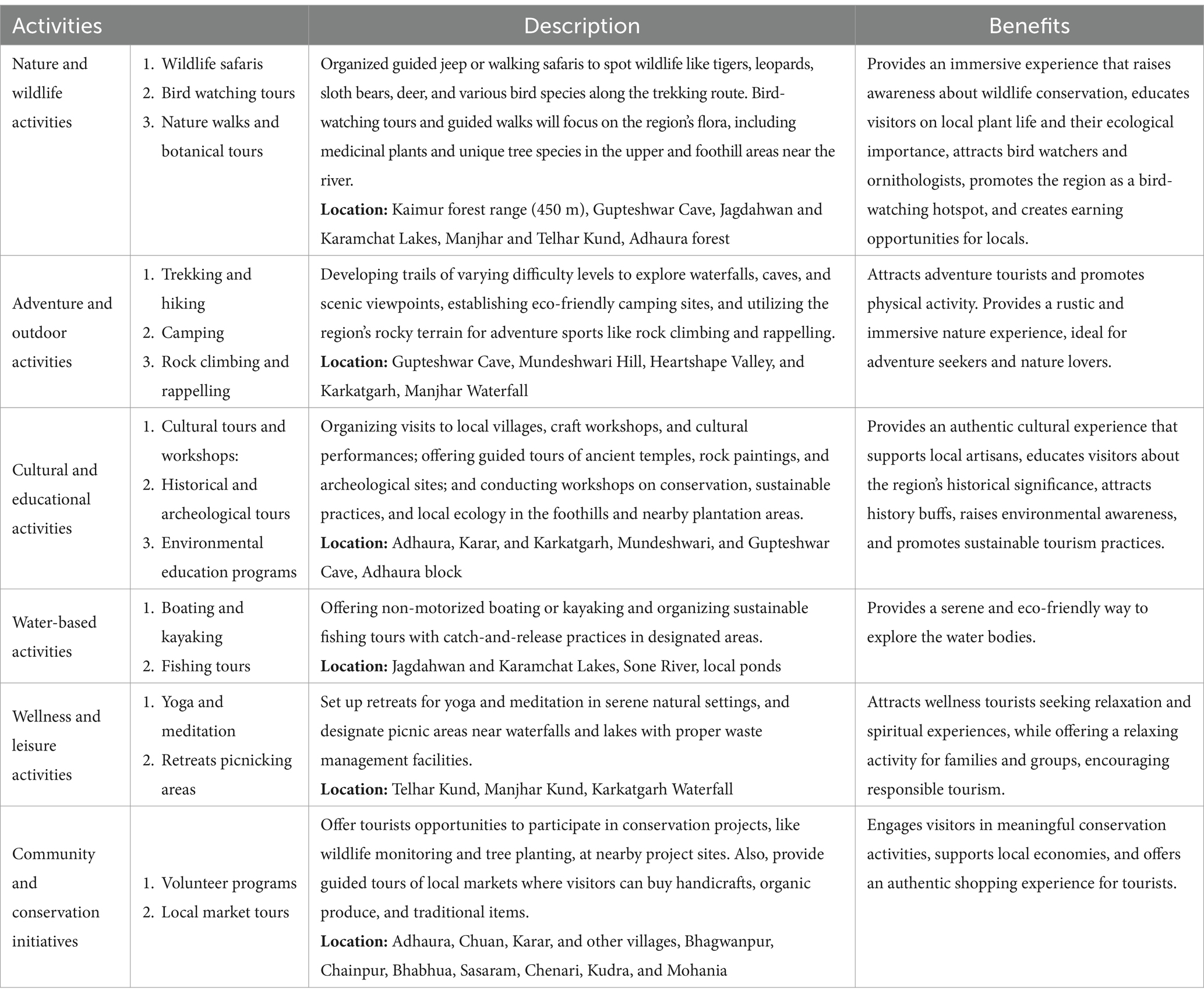
Table 6. Potential tourist activities in the study area (Source: Field Survey, Annex 1).
Monitoring and evaluation efforts will track environmental impacts and community benefits, with activities adjusted as needed to minimize harm and optimize outcomes. Periodic reviews and stakeholder feedback will support sustainability, with collaborative efforts from government, NGOs, and local communities ensuring alignment with conservation and community goals. Sustainable conservation strategies will involve zoning and management, designating core, buffer, and transition areas to control tourist activity and safeguard core conservation zones. Visitor capacity will be regulated with strict limits on access to sensitive areas, preventing ecosystem degradation. Essential infrastructure for ecotourism will include thematic paths (Figure 10), wooden walkways, observation platforms, cycling routes, and equestrian trails to enhance visitor experiences while protecting the environment (Figure 11).
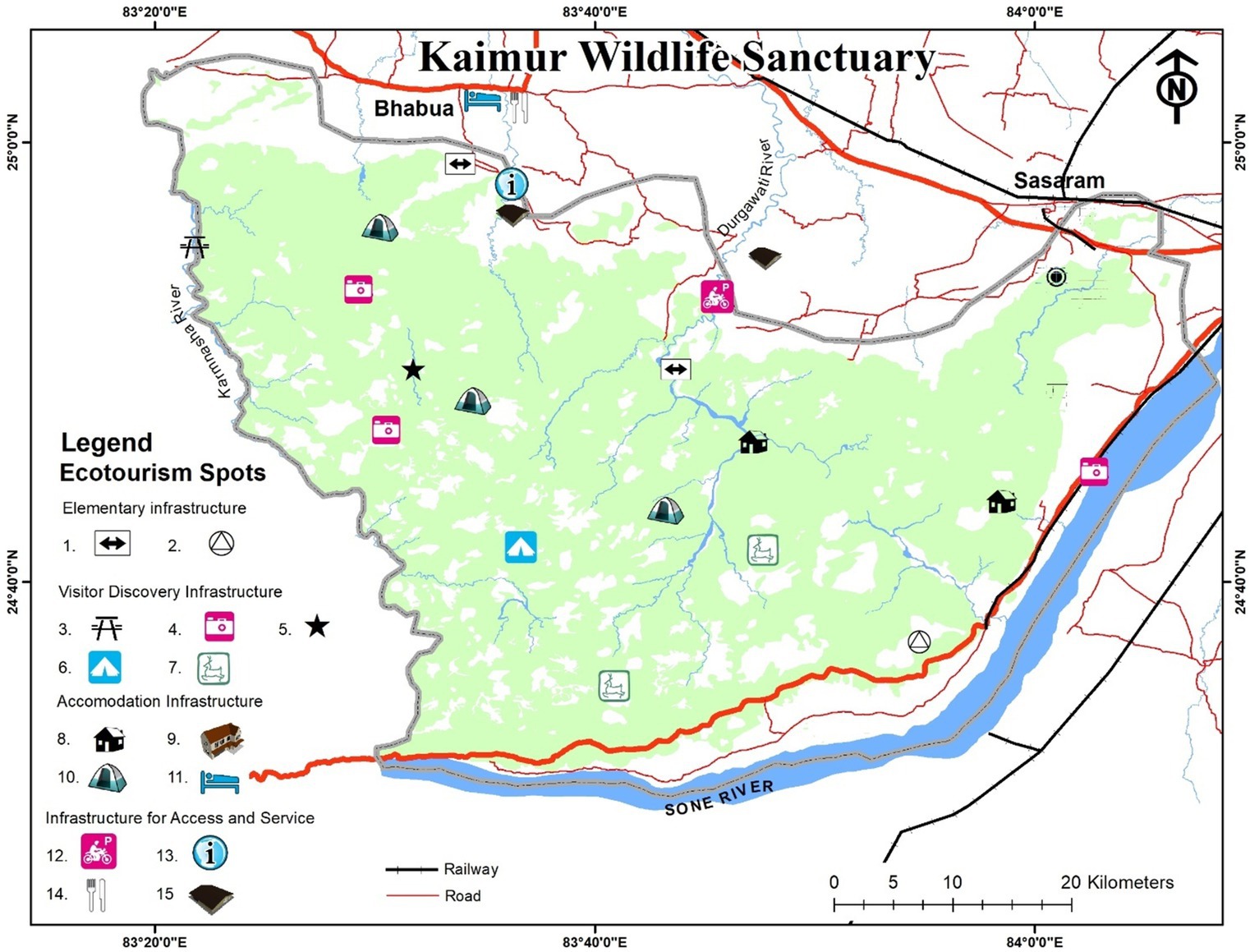
Figure 11. The thematic infrastructure serving ecotourism activities within KWS. In Legend: Elementary eco-tourism infrastructure for guidance and information: 1. Orientation indicators; 2. Informative-explanatory and interpretative panels; Visitor Discovery Infrastructure: 3. Wooden alleys and pots for access to protected biocenoses and swamps; 4. Natural point of view; 5. Point for the reference forest ecosystem; 6. Temporary shelter for ecotourists; 7. Sanctuary and point for wildlife observation; Accommodation infrastructure in adapted local structures: 8. A local’s house; 9. Agritourism guesthouse; 10. Place for tents and camping; 11. Hotel; Infrastructure for access and services, other than accommodation: 12. Parking; 13. Tourist information point; 14. Restaurant; 15. Market/point for selling handicrafts or agricultural products.
These measures will support passive, active, and educational-recreational ecotourism experiences. Community involvement is crucial, with a focus on economic empowerment through participation in ecotourism management, revenue-sharing, and job creation, particularly for women.
Local economic opportunities will be supported by skill development in guiding, hospitality, and handicrafts, with cooperative models ensuring fair benefit distribution. Promoting local products through marketplaces for crafts and organic goods will support women entrepreneurs, providing targeted assistance to strengthen their roles in the local economy.
4 Discussion
The findings from this study underscore the dual challenge facing forest management in Kaimur Wildlife Sanctuary: the need to protect forest resources while also addressing the livelihood needs of the surrounding marginalized communities (Figure 12). One example is the harvesting of the fruit locally known as Makoh, which is gathered both for subsistence and for occasional sale in markets, particularly during festivals when demand is higher.
The exploration of ecotourism as a sustainable solution is particularly significant given its potential to bridge this gap by aligning conservation goals with sustainable agricultural activities and economic incentives for residents and the investment in eco-park-type visiting-observation infrastructure (Figures 13, 14).
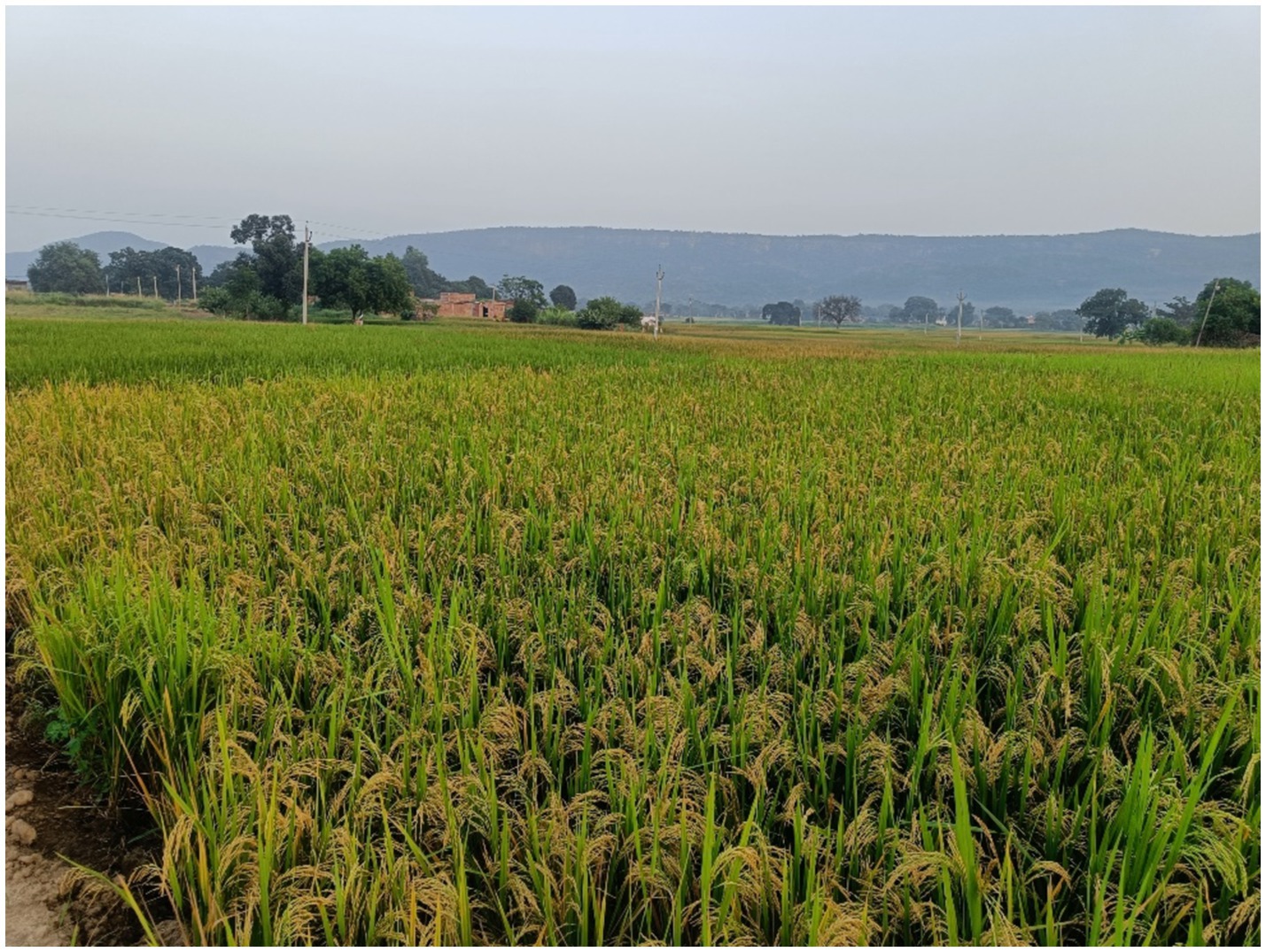
Figure 13. Transitional and sustainable economic use between the forest reserve and the adjacent agricultural lands, primarily used for subsistence cultivation of paddy and wheat, in KWS.
In line with previous studies, the results suggest that community-based ecotourism, when effectively managed, can empower local populations, alleviate poverty, and contribute to environmental sustainability by fostering local ownership and stewardship of forest resources (Tiwari et al., 2024). The results affirm the hypothesis that ecotourism can serve as a viable alternative income source for local communities, which often depend on forest resources for subsistence. As found in similar studies on ecotourism in similar forested regions in India, the development of ecotourism can reduce the communities’ dependency on direct forest extraction by offering alternative sources of income (Rampheri and Dube, 2021; Scheyvens, 1999). However, unlike other regions with established ecotourism infrastructure, Kaimur Wildlife Sanctuary faces unique challenges that need to be addressed to realize its ecotourism potential fully. These challenges include limited infrastructure, lack of training and awareness, and insufficient government support.
The limitations in infrastructure and the low public awareness regarding ecotourism were identified as major barriers to the successful implementation of ecotourism in Kaimur. These findings highlight the need for investments in infrastructure such as transportation, communication networks, and basic amenities to make the sanctuary more accessible and appealing to potential tourists. Additionally, training and awareness programs that equip locals with hospitality skills, environmental knowledge, and cultural interpretation skills are essential for creating a knowledgeable and engaged workforce capable of meeting the demands of ecotourism. Other studies on ecotourism have shown that successful programs often hinge on community training initiatives that enhance local capacity, suggesting that similar approaches could be beneficial for Kaimur (Scheyvens, 1999). The study’s insights emphasize the value of indigenous knowledge, which has historically guided sustainable forest use in the region. Incorporating this knowledge into ecotourism and forest management strategies not only preserves cultural heritage but also reinforces sustainable practices. Community members’ intimate understanding of local ecosystems could be leveraged in eco-guided tours, traditional craft production, and the creation of interpretive programs for tourists. This approach aligns with sustainable ecotourism models observed in other parts of India, where indigenous knowledge plays a crucial role in both conservation and tourist attraction efforts.
The Sanctuary exemplifies the complex relationship between conservation and economic development. While ecotourism presents an opportunity for sustainable income, it is essential to maintain ecological integrity and avoid over-commercialization, which could lead to environmental degradation. Monitoring and regulating tourism activities to ensure minimal impact on local biodiversity will be fundamental to achieving a balance between conservation and economic benefits. Moreover, adaptive management practices that are responsive to changes in the ecosystem and community needs could help in sustaining the benefits of ecotourism over the long term. While the study provides valuable insights, several limitations must be acknowledged. The cross-sectional design, while effective for capturing a snapshot of current conditions, may not fully capture the long-term effects of ecotourism on community livelihoods and forest conservation. Future longitudinal studies could provide a more detailed understanding of how ecotourism initiatives evolve over time and impact resource use patterns. Additionally, further research into specific ecotourism models, including agro-ecotourism and cultural ecotourism, could reveal additional avenues for economic development in the Kaimur region.
5 Conclusion
This study highlights the significant role of community-based ecotourism in the sustainable management of Kaimur Wildlife Sanctuary (KWS) and its potential to address the socio-economic needs of local communities. As forest resources continue to be strained by unsustainable practices, ecotourism presents a promising alternative that aligns conservation goals with livelihood generation. The results indicate that ecotourism could serve as a sustainable income source, reducing local dependency on direct forest extraction and supporting conservation efforts. However, realizing this potential requires overcoming critical barriers, including inadequate infrastructure, limited public awareness, social disparity, market-based opportunities, and the absence of comprehensive training programs for residents.
To maximize the effectiveness of ecotourism in KWS, several recommendations emerge from this study. First, investment in eco-friendly infrastructure such as improved transportation networks, lodging facilities, and nature trails is essential for enhancing accessibility and visitor satisfaction. Second, community training programs focused on environmental stewardship, hospitality, and cultural heritage interpretation are vital to develop a skilled local workforce. Such training would empower residents, particularly marginalized groups, to take active roles in ecotourism, fostering both economic independence and a sense of environmental stewardship. Third, integrating indigenous knowledge into ecotourism strategies can enhance the authenticity of visitor experiences and promote sustainable practices rooted in local traditions. Incorporating this knowledge in eco-tours, craft production, and interpretive programs will preserve cultural heritage while also enhancing conservation efforts. Fourth, ongoing monitoring and adaptive management are necessary to ensure ecotourism’s ecological sustainability. Regular assessments of environmental impact and visitor satisfaction will allow for data-driven adjustments, helping to balance economic and conservation goals effectively.
For future research, longitudinal studies are recommended to evaluate the long-term impacts of ecotourism on community livelihoods and forest conservation. Additionally, exploring specific ecotourism models such as agro-ecotourism and cultural ecotourism could identify diverse opportunities for economic development in the Kaimur region. By fostering community engagement and addressing these identified barriers, ecotourism in KWS can become a model for sustainable forest management, offering lasting benefits to both biodiversity and local communities.
Data availability statement
The raw data supporting the conclusions of this article will be made available by the authors without undue reservation.
Ethics statement
This study was approved by the Ethics Committee of Kalindi College, University of Delhi and informed consent was obtained from the participants. Written informed consent was obtained from the [individual(s) and/or minor(s)’ legal guardian/next of kin] for the publication of any potentially identifiable images or data included in this article.
Author contributions
SB: Conceptualization, Data curation, Formal analysis, Investigation, Methodology, Project administration, Software, Supervision, Validation, Visualization, Writing – original draft, Writing – review & editing. ID: Conceptualization, Data curation, Formal analysis, Funding acquisition, Investigation, Methodology, Supervision, Validation, Visualization, Writing – review & editing, Writing – original draft. SS: Conceptualization, Data curation, Formal analysis, Investigation, Methodology, Resources, Software, Visualization, Writing – review & editing, Writing – original draft.
Funding
The author(s) declare that no financial support was received for the research, authorship, and/or publication of this article.
Acknowledgments
We would like to thank the three editors-in-chief and the reviewers for their comments and advice. This study was part of the research activities included in the EU Erasmus+ program project, KA 107, for the period 2022-2025. These activities involved the authors of this study, along with the University of Oradea, Romania, and the University of Delhi, India, as institutional partners in the EU Erasmus+ project.
Conflict of interest
The authors declare that the research was conducted in the absence of any commercial or financial relationships that could be construed as a potential conflict of interest.
Publisher’s note
All claims expressed in this article are solely those of the authors and do not necessarily represent those of their affiliated organizations, or those of the publisher, the editors and the reviewers. Any product that may be evaluated in this article, or claim that may be made by its manufacturer, is not guaranteed or endorsed by the publisher.
Supplementary material
The Supplementary material for this article can be found online at: https://www.frontiersin.org/articles/10.3389/ffgc.2024.1491917/full#supplementary-material
References
Abbot, J. I. O., Thomas, D. H. L., Gardner, A. A., Neba, S. E., and Khen, M. W. (2001). Understanding the links between conservation and development in the Bamenda Highland, Cameroon. World Dev. 29, 1115–1136. doi: 10.1016/S0305-750X(01)00033-X
Abildtrup, J., Garcia, S., Bøye Olsen, S., and Stenger, A. (2013). Spatial preference heterogeneity in forest recreation. Ecol. Econ. 92, 67–77. doi: 10.1016/j.ecolecon.2013.01.001
Agarwal, B. (2009). Gender and forest conservation: the impact of women’s participation in community forest governance. Ecol. Econ. 68, 2785–2799. doi: 10.1016/j.ecolecon.2009.04.025
Ahtikoski, A., Tuulentie, S., Hallikainen, V., Nivala, V., and Vatanen, E. (2011). Potential trade-offs between nature-based tourism and forestry: a case study in northern Finland. Forests 2, 894–912. doi: 10.3390/f2040894
Anand, A. R., and Peters, M. S. (2022). Contextualizing groundwater crisis in the light of disaster risk management in India. Admin. Environ. Law Rev. 3, 39–50. doi: 10.25041/aelr.v3i1.2490
Anand, A., Singh, A. K., Abhishek,, and Kumar, A. (2022). Avifaunal diversity and status assessment in Kaimur Wildlife Sanctuary, Bihar, India. Indian J. Nat. Sci. 13:48711. Available at: https://www.tnsroindia.org.in
Andereck, K. L., Valentine, K. M., Knopf, R. C., and Vogt, C. A. (2005). Residents’ perceptions of community tourism impacts. Ann. Tour. Res. 32, 1056–1076. doi: 10.1016/j.annals.2005.03.001
Angelsen, A., Jagger, P., Babigumira, R., Belcher, B., Hogarth, N. J., Bauch, S., et al. (2014). Environmental income and rural livelihoods: a global-comparative analysis. World Dev. 64, S12–S28. doi: 10.1016/j.worlddev.2014.03.006
Annan-Diab, F., and Molinari, C. (2017). Interdisciplinarity: practical approach to advancing education for sustainability and for the sustainable development goals. Int. J. Manag. Educ. 15, 73–83. doi: 10.1016/j.ijme.2017.03.006
Ashley, C., and Roe, D. (2002). Making tourism work for the poor: strategies and challenges in southern Africa. Dev. South. Afr. 19, 61–82. doi: 10.1080/03768350220123855
Atchombou, J. B., Shidiki, A. A., Tchamba, M. N., and Alexis, K. S. (2023). Opinion of stakeholders on the management of ecotourism in the Benue National Park of the north region of Cameroon. Open J. Forest. 13, 92–109. doi: 10.4236/ojf.2023.131007
Banday, M., Islam, M. A., Pala, N. A., Rashid, M., Ahmad, P. I., Rather, M. M., et al. (2021). “Livelihood security and forest resource extraction by forest fringe communities in the Indian Himalayan region” in Diversity and dynamics in forest ecosystems. (India: Faculty of Forestry, Sher-e-Kashmir University of Agricultural Sciences and Technology of Kashmir). 163–194.
Banerjee, A. (2010). Tourism in protected areas: worsening prospects for tigers? Econ. Polit. Wkly. 45, 27–29. doi: 10.2307/25664191
Bansal, S. P., and Kumar, J. (2011). Ecotourism for community development: a stakeholder’s perspective in great Himalayan National Park. Int. J. Soc. Ecol. Sustain. Dev. 2, 31–40. doi: 10.4018/978-1-4666-3613-2.ch007
Battles, J. J., Shlisky, A. J., Barrett, R. H., Heald, R. C., and Allen-Diaz, B. H. (2001). The effects of forest management on plant species diversity in a Sierran conifer forest. For. Ecol. Manag. 146, 211–222. doi: 10.1016/S0378-1127(00)00463-1
Bhattacharya, P., Pradhan, L., and Yadav, G. (2010). Joint forest management in India: experiences of two decades. Resour. Conserv. Recycl. 54, 469–480. doi: 10.1016/j.resconrec.2009.10.003
Blangy, S., and Mehta, H. (2006). Ecotourism and ecological restoration. J. Nat. Conserv. 14, 233–236. doi: 10.1016/j.jnc.2006.05.009
Boley, B. B., and Green, G. T. (2016). Ecotourism and natural resource conservation: the ‘potential’ for a sustainable symbiotic relationship. J. Ecotour. 15, 36–50. doi: 10.1080/14724049.2015.1094080
Bose, P., Arts, B., and van Dijk, H. (2012). ‘Forest governmentality’: a genealogy of subject-making of forest-dependent ‘scheduled tribes’ in India. Land Use Policy 29, 664–673. doi: 10.1016/j.landusepol.2011.11.002
Bötsch, Y., Tablado, Z., Scherl, D., Kéry, M., Graf, R. F., and Jenni, L. (2018). Effect of recreational trails on forest birds: human presence matters. Front. Ecol. Evol. 6:175. doi: 10.3389/fevo.2018.00175
Chen, Z., Yang, J., and Xie, Z. (2005). Economic development of local communities and biodiversity conservation: a case study from Shennongjia National Nature Reserve, China. Biodivers. Conserv. 14, 2095–2108. doi: 10.1007/s10531-004-436
Clifton, J., and Benson, A. (2006). Planning for sustainable ecotourism: the case for research ecotourism in developing country destinations. J. Sustain. Tour. 14, 238–254. doi: 10.1080/09669580608669057
Coleman, E. A., and Fleischman, F. D. (2012). Comparing forest decentralization and local institutional change in Bolivia, Kenya, Mexico, and Uganda. World Dev. 40, 836–849. doi: 10.1016/j.worlddev.2011.09.008
Coleman, E. A., and Mwangi, E. (2013). Women’s participation in forest management: a cross-country analysis. Glob. Environ. Chang. 23, 193–205. doi: 10.1016/j.gloenvcha.2012.10.005
Coria, J., and Calfucura, E. (2012). Ecotourism and the development of indigenous communities: the good, the bad, and the ugly. Ecol. Econ. 73, 47–55. doi: 10.1016/j.ecolecon.2011.10.024
Das, S. (2011). Ecotourism, sustainable development, and the Indian state. Econ. Polit. Wkly. 37, 2923–2930. Available at: https://www.epw.in/journal/2011/37/special-articles/ecotourism-sustainable-development-and-indian-state.html
Das, M., and Chatterjee, B. (2015). Ecotourism: a panacea or a predicament? Tour. Manag. Perspect. 14, 3–16. doi: 10.1016/j.tmp.2015.01.002
Dash, M., Behera, B., and Rahut, D. B. (2016). Determinants of household collection of non-timber forest products (NTFPs) and alternative livelihood activities in Similipal Tiger Reserve, India. Forest Policy Econ. 73, 215–228. doi: 10.1016/j.forpol.2016.09.012
Davidar, P., Sahoo, S., Mammen, P. C., Acharya, P., Puyravaud, J.-P., Arjunan, M., et al. (2010). Assessing the extent and causes of forest degradation in India: where do we stand? Biol. Conserv. 143, 2937–2944. doi: 10.1016/j.biocon.2010.04.032
De Meo, I., Paletto, A., and Cantiani, M. G. (2015). The attractiveness of forests: preferences and perceptions in a mountain community in Italy. Ann. For. Res. 58, 145–156. doi: 10.15287/afr.2015.308
Dinca, I., Keshavarz, S. R., and Almodaresi, S. A. (2023). Landscapes of the Yazd-Ardakan plain (Iran) and the assessment of geotourism: contribution to the promotion and practice of geotourism and ecotourism. Land 12:858. doi: 10.3390/land12040858
Dudek, T. (2017). Recreational potential as an indicator of accessibility control in protected mountain forest areas. J. Mt. Sci. 14, 1419–1427. doi: 10.1007/s11629-016-4018-z
Eshun, G., Adjei, P. O., and Segbefia, A. Y. (2016). Beyond business as usual: implications of tourist experiences for ecotourism development. Afr. J. Hosp. Tour. Leis. 5. Available at: http://www.ajhtl.com
FAO (2014). State of the world’s forests: Enhancing the socioeconomic benefits from forests (SOFO 2014). Food and Agriculture Organization of the United Nations. Available at: https://openknowledge.fao.org/server/api/core/bitstreams/89a44ced-a3c7-41f7-973d-5e3b4e21ddbc/content
Forest Survey of India. (2021). State forest report 2021. Ministry of Environment, Forest and Climate Change, Government of India. Available at: https://fsi.nic.in/ (Accessed February 23, 2024).
Fredman, P., Romild, U., Yuan, M., and Wolf-Watz, D. (2012). Latent demand and time contextual constraints to outdoor recreation in Sweden. Forests 3, 1–21. doi: 10.3390/f3010001
Goodwin, H. J. (2002). Local community involvement in tourism around national parks: opportunities and constraints. Curr. Issue Tour. 5, 338–360. doi: 10.1080/13683500208667928
Guha, I., and Ghosh, S. (2007). Does tourism contribute to local livelihoods? A case study of tourism, poverty, and conservation in the Indian Sundarbans. Kathmandu: The Institute of Development Studies and Partner Organizations. Available at: https://hdl.handle.net/20.500.12413/4368
Gulinck, H., Vyverman, N., Van Bouchout, K., and Gobin, A. (2001). Landscape as framework for integrating local subsistence and ecotourism: a case study in Zimbabwe. Landsc. Urban Plan. 53, 173–182. doi: 10.1016/s0169-2046(00)00152-3
Gyan, P., and Nyaupane, S. P. (2011). Linkages among biodiversity, livelihood, and tourism. Ann. Tour. Res. 38, 1344–1366. doi: 10.1016/j.annals.2011.03.006
Harbi, J., Erbaugh, J. T., Sidiq, M., Haasler, B., and Nurrochmat, D. R. (2018). Making a bridge between livelihoods and forest conservation: lessons from non-timber forest products’ utilization in South Sumatera, Indonesia. Forest Policy Econ. 94, 1–10. doi: 10.1016/j.forpol.2018.05.011
Hegde, R., and Enters, T. (2000). Forest products and household economy: a case study from Mudumalai wildlife sanctuary, Southern India. Environ. Conserv. 27, 250–259. doi: 10.1017/s037689290000028x
Heyman, E. (2012). Analysing recreational values and management effects in an urban forest with the visitor-employed photography method. Urban For. Urban Green. 11, 267–277. doi: 10.1016/j.ufug.2012.02.003
Holland, J., Burian, M., and Dixey, L. (2003). Tourism in poor rural areas: diversifying the product and expanding the benefits in rural Uganda and the Czech Republic. Available at: http://www.propoortourism.org.uk/12_rural_areas.pdf (Accessed March 18, 2008).
Horton, L. R. (2009). Buying up nature: economic and social impacts of Costa Rica’s ecotourism boom. Lat. Am. Perspect. 166, 93–107. doi: 10.1177/0094582X09334299
Hrůza, P., Pelikán, P., and Olišarová, L. (2021). Single-track bike trails in the Moravian karst as part of forest recreation. Forests 12:1601. doi: 10.3390/f12111601
Hugo, N. C., and Nyaupane, G. P. (2010). Poverty alleviation in third world countries through tourism development: A comparison study of Costa Rica and Nicaragua. Amherst: University of Massachusetts. Available at: https://hdl.handle.net/20.500.14394/48273
Hvenegaard, G. T. (1994). Ecotourism: a status report and conceptual framework. J. Tour. Stud. 5, 24–35.
Islam, M. A., Quli, S. M. S., Sofi, P. A., Bhat, G. M., and Malik, A. R. (2015). Livelihood dependency of indigenous people on forest in Jharkhand, India. Vegetos (Bareilly, India) 28:106. doi: 10.5958/2229-4473.2015.00074.9
Jalani, J. O. (2012). Local people’s perception on the impacts and importance of ecotourism in Sabang, Palawan, Philippines. Procedia. Soc. Behav. Sci. 57, 247–254. doi: 10.1016/j.sbspro.2012.09.1182
Johnson, A. F., Gonzales, C., Townsel, A., and Cisneros-Montemayor, A. M. (2019). Marine ecotourism in the Gulf of California and the Baja California peninsula: research trends and information gaps. Sci. Mar. 83:177. doi: 10.3989/scimar.04880.14a
Kahveci, G. (2022). General characteristics and distribution of forest relicts in Central Anatolia. Forestist 72, 192–198. doi: 10.54614/forestist.2022.21056
Kimengsi, J. N. (2014). Threats to ecotourism development and forest conservation in the Lake Barombi Mbo area (LBMA) of Cameroon. J. Int. Wildl. Law Policy 17, 213–230. doi: 10.1080/13880292.2014.957033
Kiper, T. (2013). “Role of ecotourism in sustainable development” in Advances in landscape architecture (London: InTech), 773–802.
Kiss, A. (2004). Is community-based ecotourism (CBET) a good use of biodiversity conservation? Trends Ecol. Evol. 19, 232–237. doi: 10.1016/j.tree.2004.03.010
Komossa, F., van der Zanden, E. H., Schulp, C. J. E., and Verburg, P. H. (2018). Mapping landscape potential for outdoor recreation using different archetypical recreation user groups in the European Union. Ecol. Indic. 85, 105–116. doi: 10.1016/j.ecolind.2017.10.015
Korpela, K., Borodulin, K., Neuvonen, M., Paronen, O., and Tyrväinen, L. (2014). Analyzing the mediators between nature-based outdoor recreation and emotional well-being. J. Environ. Psychol. 37, 1–7. doi: 10.1016/j.jenvp.2013.11.003
Kumar, M., Nisha Phukon, S., and Singh, H. (2020). The role of communities in sustainable land and forest management. Forest resources resilience and conflicts. 305–308. doi: 10.1016/B978-0-12-822931-6.00024-1
Lindberg, S. E., Hanson, P. J., Meyers, T. P., and Kim, K.-H. (1998). Air/surface exchange of mercury vapor over forests—the need for a reassessment of continental biogenic emissions. Atmos. Environ. 32, 895–908. doi: 10.1016/s1352-2310(97)00173-8
Mishra, B. K., Badola, R., and Bharadwaj, A. K. (2009). Social issues and concerns in biodiversity conservation: experiences from wildlife protected areas in India. Trop. Ecol. 50, 147–161. Available at: https://www.researchgate.net/publication/285906647_Social_issues_and_concerns_in_biodiversity_conservation
Molinas, J. (1998). The impact of inequality, gender, external assistance and social capital on local-level cooperation. World Development. 26, 413–431. doi: 10.1016/S0305-750X(97)10066-3
Mustika, P. L. K., Birtles, A., Welters, R., and Marsh, H. (2012). The economic influence of community-based dolphin watching on a local economy in a developing country: implications for conservation. Ecol. Econ. 79, 11–20. doi: 10.1016/j.ecolecon.2012.04.018
Newton, P., Miller, D. C., Byenkya, M. A. A., and Agrawal, A. (2016). Who are forest-dependent people? A taxonomy to aid livelihood and land use decision-making in forested regions. Land Use Policy 57, 388–395. doi: 10.1016/j.landusepol.2016.05.032
Patel, J. K., and Anuragi, R. B. (2023). Identifying the ecotourism potential locations using AHP and weighted overlay analysis: a case of Bundelkhand region in Central India. Pap. Appl. Geogr. 10, 1–17. doi: 10.1080/23754931.2023.2254786
Pujar, S. C., and Mishra, N. (2021). Ecotourism industry in India: a review of current practices and prospects. Anatolia 32, 289–302. doi: 10.1080/13032917.2020.1861040
Rampheri, M. B., and Dube, T. (2021). Local community involvement in nature conservation under the auspices of community-based natural resource management: a state-of-the-art review. Afr. J. Ecol. 59, 799–808. doi: 10.1111/aje.12801
Rathmann, J. (2023). “Introduction: forests as a recreation area” in Forest as a health resource. (Wiesbaden: Springer).
Reimer, J. K., and Walter, P. (2013). How do you know it when you see it? Community-based ecotourism in the Cardamom Mountains of southwestern Cambodia. Tour. Manag. 34, 122–132. doi: 10.1016/j.tourman.2012.04.002
Ristić, V., Trišić, I., Štetić, S., Nechita, F., Candrea, A. N., Majstorović, N., et al. (2024). Importance of forest ecosystem within important plant areas (IPAs) for the development of nature-based tourism—a case study of Fruška Gora National Park. Forests 15:1213. doi: 10.3390/f15071213
Salafsky, N., and Wollenberg, E. (2000). Linking livelihoods and conservation: a conceptual framework and scale for assessing the integration of human needs and biodiversity. World Dev. 28, 1421–1438. doi: 10.1016/s0305-750x(00)00031-0
Scheyvens, R. (1999). Ecotourism and the empowerment of local communities. Tour. Manag. 20, 245–249. doi: 10.1016/s0261-5177(98)00069-7
Scheyvens, R. (2000). Promoting women’s empowerment through involvement in ecotourism: experiences from the third world. J. Sustain. Tour. 8, 232–249. doi: 10.1080/09669580008667360
Sen, S., Mishra, M., and Patranabis-Deb, S. (2014). Petrological study of the Kaimur group sediments, Vindhyan Supergroup, Central India: implications for provenance and tectonics. Geosci. J. 18:10. doi: 10.1007/s12303-014-0008-8
Shah, A. (2007). Management of protected areas: exploring an alternative in Gir. Econ. Polit. Wkly. 42, 2923–2930. doi: 10.2307/4419791
Shamsoddini, A. (2015). Evaluation of tourism status in sustainable rural development by Reynard model (case study: Pa Ghaleh village, Mamasani County, Iran). Open J. Ecol. 5, 80–85. doi: 10.4236/oje.2015.53008
Shariff, N. S., Yusof, Y., and Hussin, N. Z. I. (2020). Tourist perception towards recreation centres in Malaysia. Universiti Malaysia Terengganu J. Undergr. Res. 2, 103–114. doi: 10.46754/umtjur.v2i3.171
Sharpley, R. (2006). Ecotourism: a consumption perspective. J. Ecotour. 5, 7–22. doi: 10.1080/14724040608668444
Stronza, A. (2007). The economic promise of ecotourism for conservation. J. Ecotour. 6, 210–230. doi: 10.2167/joe177.0
Stronza, A., and Gordillo, J. (2008). Community views of ecotourism. Ann. Tour. Res. 35, 448–468. doi: 10.1016/j.annals.2008.01.002
Stylidis, D., Woosnam, K. M., and Kim, S. (2022). Perceptions of attractions, residents as “more knowledgeable others” and destination image: evidence from two destinations. Int. J. Tour. Res. 24, 472–486. doi: 10.1002/jtr.2515
Sunderlin, W. D., Angelsen, A., Belcher, B., Burgers, P., Nasi, R., Santoso, L., et al. (2005). Livelihoods, forests, and conservation in developing countries: an overview. World Dev. 33, 1383–1402. doi: 10.1016/j.worlddev.2004.10.004
Surendran, A., and Sekar, C. (2011). A comparative analysis on the socio-economic welfare of dependents of the Anamalai Tiger Reserve (ATR) in India. Margin J. Appl. Econ. Res. 5, 361–379. doi: 10.1177/097380101100500304
Tahoor, A., Musavi, A., and Khan, J. A. (2016). Biomass extraction impact on vegetation community structure in Kaimur Wildlife Sanctuary, Uttar Pradesh, India. Trop. Plant Res. 3, 142–152. Available at: https://www.tropicalplantresearch.com/archives/2016/vol3issue1/18.pdf
Termansen, M., Zandersen, M., and McClean, C. J. (2008). Spatial substitution patterns in forest recreation. Reg. Sci. Urban Econ. 38, 81–97. doi: 10.1016/j.regsciurbeco.2008.01.006
Tiwari, S., Marahatta, D., and Devkota, H. (2024). Aspects of community participation in eco-tourism: a systematic review. J. Multidis. Res. Adv. 2, 71–79. doi: 10.3126/jomra.v2i1.66650
Tudoran, G.-M., Cicșa, A., Cicșa, M., and Dobre, A.-C. (2022). Management of recreational forests in the Romanian Carpathians. Forests 13:1369. doi: 10.3390/f13091369
Veal, A. J. (2006). Research methods for leisure and tourism. 3rd Edition. Prentice Hall, London: Pearson.
Wall, G. (1997). FORUM: is ecotourism sustainable? Environ. Manag. 21, 483–491. doi: 10.1007/s002679900044
Wishitemi, B. E. L., Momanyi, S. O., Ombati, B. G., and Okello, M. M. (2015). The link between poverty, environment, and ecotourism development in areas adjacent to Maasai Mara and Amboseli protected areas, Kenya. Tour. Manag. Perspect. 16, 306–317. doi: 10.1016/j.tmp.2015.07.003
World Bank (2004). Sustaining forests: A development strategy. Washington, DC: The International Bank for Reconstruction and Development/The World Bank.
World Tourism Organization (UNWTO) (2002). Québec Declaration on Ecotourism. UNWTO Declarations. 12. Madrid, Spain: UNWTO.
Wunder, S. (1999). Promoting forest conservation through ecotourism income: A case study from the Ecuadorian Amazon region. CIFOR occasional paper no. 21. Indonesia: Center for International Forestry Research.
Wunder, S., Angelsen, A., and Belcher, B. (2014). Forests, livelihoods, and conservation: broadening the empirical base. World Dev. 64, S1–S11. doi: 10.1016/j.worlddev.2014.03.007
Keywords: ecosystem management, sustainable development, ecotourism, indigenous knowledge, marginalized communities, Wildlife Sanctuary, poverty alleviation, inclusive forest governance
Citation: Bhushan S, Dincă I and Shikha S (2024) Evaluating local livelihoods, sustainable forest management, and the potential for ecotourism development in Kaimur Wildlife Sanctuary, India. Front. For. Glob. Change. 7:1491917. doi: 10.3389/ffgc.2024.1491917
Edited by:
Mohammad Imam Hasan Reza, Centre for Environment and Sustainability, Presidency Education, BangladeshReviewed by:
Bhupendra Singh, VCSG Uttarakhand University, IndiaRadek Rinn, Czech University of Life Sciences Prague, Czechia
Copyright © 2024 Bhushan, Dincă and Shikha. This is an open-access article distributed under the terms of the Creative Commons Attribution License (CC BY). The use, distribution or reproduction in other forums is permitted, provided the original author(s) and the copyright owner(s) are credited and that the original publication in this journal is cited, in accordance with accepted academic practice. No use, distribution or reproduction is permitted which does not comply with these terms.
*Correspondence: Iulian Dincă, aXVsaWFuX2RpbmNhQHlhaG9vLmNvLnVr; aWRpbmNhQHVvcmFkZWEucm8=
 Shashi Bhushan
Shashi Bhushan Iulian Dincă
Iulian Dincă Shalini Shikha
Shalini Shikha